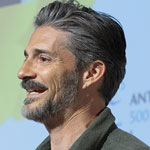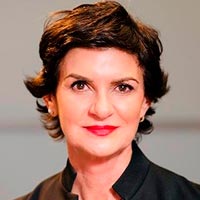Bachelor's Degree in Digital and Multimedia Design
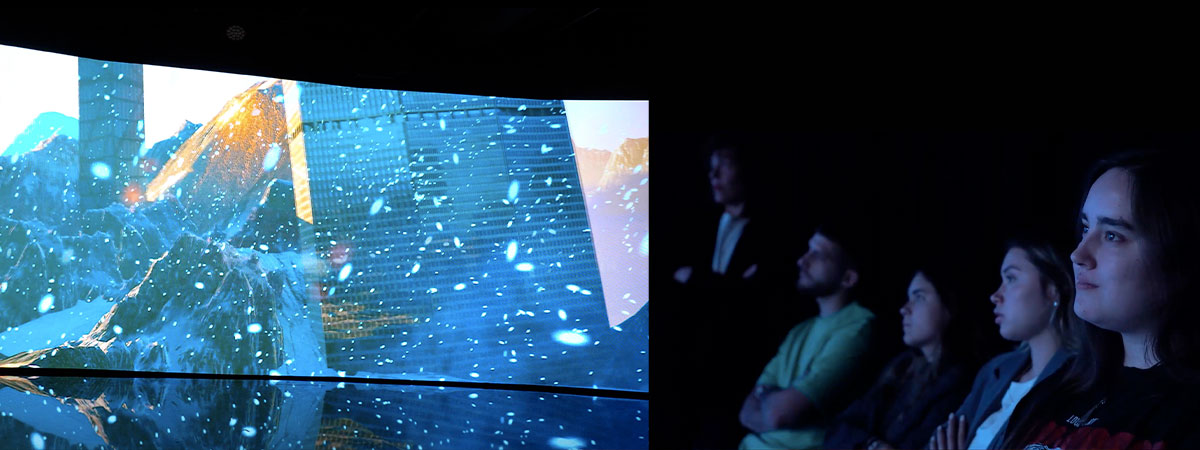
Up-to-date program adapted to the needs of the digital design sector
The Bachelor's Degree in Digital and Multimedia Design combines a creative vocation and a passion for technology and design. An innovative and multidisciplinary program whose objective is for students to achieve their own style that they can apply to designing and creating digital content in any type of communication medium.
Thanks to a versatile, up-to-date curriculum that adapted to the needs of the digital design sector, the electives offered in it and the fact that the professors who teach the subjects are professionals in the sector, the bachelor's degree offers students the possibility of learning to generate aesthetic solutions to different communication demands.
Immersed in a multimedia reality, and thanks to the knowledge acquired throughout the degree, which delves into the fundamentals of the main branches of digital design, our graduates will enter the professional field with one of the most demanded profiles by Agencies and Studios today: multimedia creator. Thanks, as we said, to the wide range of electives offered by the curriculum of the Bachelor's in Digital and Multimedia Design, students will be able to model their aesthetic interests to strengthen their skills and become professionals in one or more of the most demanded profiles in the design sector: graphic design, web design, audiovisual design and the creation of videogames.
"The Bachelor's Degree in Digital and Multimedia Design is a program that harmonizes creativity, art, and technology, tailored to meet the dynamic needs of the digital design sector. With a strong emphasis on creativity across various disciplines, this program provides comprehensive training to nurture highly skilled designers capable of meeting diverse communication needs. Students graduate as adept designers adept in all facets of the digital landscape: encompassing traditional graphic design, web design, audiovisual creation, and video game development."
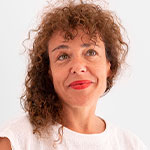
Amaya Hernández Director of the Bachelor’s Degree in Digital Design
Double Degrees, double opportunities Combine your Degree in Digital and Multimedia Design and obtain a Nebrija NextGen Talent Microcredential
What is the Nebrija NextGen Talent Microcredential?
Starting in the 2026/27 academic year, our Double Degrees will include this qualification, allowing our students to enrich their training and lead in an increasingly globalized world.
It consists of three essential elements:
From the 1st to the 4th year, there will be six work sessions of two and a half hours each, with expert guests from companies, media outlets, agencies, firms, and institutions to address topics such as:
- The most disruptive technological innovations
- New work methods and business models
- Deep Learning, Cognitive Science, Critical Thinking
- Global Affairs, Public Affairs
- New rights in the digital age
- Sustainability, Diversity, 2030 Agenda
Competencies:
- Global vision and critical thinking: abilities to design the future.
- Coherence and entrepreneurship: making the right decisions
- Teamwork and generosity: nurturing personal relationships
These six competencies will be assessed through an online assessment at the beginning of the program, providing each student with a personal development report. Based on that report, we will have two development sessions each year to create and monitor an action plan focusing on two competencies per year.
At the beginning of the fourth year, a new online assessment will allow us to measure each student’s personal improvement. In addition, it will offer guidance on the positions and sectors within the global market that best match their profile.
At the end of the Double Degree, students will participate in a one-week Study Tour at one of the following destinations:
- Montreal (McGill)
- Miami
- Boston (Babson College)
- Hong Kong
- Singapore
- Shanghai
Learn about our 80% Excellence Scholarships for these Double Degrees and benefit from an exclusive Mentoring Program.
Student's work from the subject Video Game Design. Javier Ruza.
Students of the Bachelor's Degree in Digital and Multimedia Design take on the algorithm at Madrid’s largest digital art competition: the “MMMAD Festival”.
Nebrija Designs
Our students learn by doing, transferring what they learn in the classroom to real projects and activities with the aim of bringing them as close as possible to the reality of their professional sector. Talent, creativity and work united in continuous learning.
Esthetic solutions to different communication demands
Curriculum
Verified on 29-10-2025
Our curriculum has been developed in accordance with the new guidelines set by current legislation, and has been verified by the National Agency for Quality Assessment and Accreditation.
The student must take 240 credits
First Year 60 ECTS
First Semester 30 ECTS- 6 ECTS | Art History
- 6 ECTS | Graphic Expression: Color and Shape
- 6 ECTS | Geometric Representation Systems
- 6 ECTS | Photography
- 6 ECTS | Writing and Argumentation
Second Semester 30 ECTS- 6 ECTS | History of Design
- 6 ECTS | Vector Design
- 6 ECTS | Digital Illustration
- 6 ECTS | Audiovisual Language
- 6 ECTS | Digital Tools
Second Year 60 ECTS
First Semester 30 ECTS- 6 ECTS | Creative Thinking
- 6 ECTS | Digital Image Processing and Retouching
- 6 ECTS | Web Architecture and Usability
- 6 ECTS | 3D Modeling and Texturing I
- 6 ECTS | Typography
Second Semester 30 ECTS- 6 ECTS | Communication Skills
- 6 ECTS | Intellectual Property and Copyright
- 6 ECTS | Programming Language
- 6 ECTS | 3D Modeling and Texturing II
- 6 ECTS | University Activities (**)
(**) Students can choose to participate in university clubs or take the Human Rights course.
Third Year 60 ECTS
First Semester 30 ECTS- 6 ECTS | 2D Animation: Motion Graphics
- 6 ECTS | Digital Editing
- 6 ECTS | Elective 1
- 6 ECTS | Art Direction
- 6 ECTS | Professional Competences
Second Semester 30 ECTS- 6 ECTS | 3D Animation
- 6 ECTS | Post-Production
- 18 ECTS | Professional Academic Internships
Fourth Year 60 ECTS
>First Semester 30 ECTS- 6 ECTS | Elective 2
- 6 ECTS | Web and Mobile Application Design
- 6 ECTS | Elective 3
- 6 ECTS | Elective 4
- 6 ECTS | Final Project Workshop
Second Semester 30 ECTS- 6 ECTS | Digital Scenography and Video Mapping
- 6 ECTS | Digital Art
- 6 ECTS | Elective 5
- 6 ECTS | Professional English
- 6 ECTS | Final Project
More information about these subjects
Elective Subject for the Specialization in Graphic Design and Brand Identity- 6 ECTS | Brand Communication
Elective Subject for the Specialization in Video Game Design- 6 ECTS | Video Game Script and Storyboard
- 6 ECTS | Entrepreneurship in Communication
- 6 ECTS | Data and Analytics: Business Intelligence
- 6 ECTS | Content Creation: Social Networks and Influence
- 6 ECTS | Transmedia Art
- 6 ECTS | Brand Experience and Event Creation
- 6 ECTS | Scenography and Lighting
Elective Subjects for the Specialization in Graphic Design and Brand Identity- 6 ECTS | Editorial Design
- 6 ECTS | Infographics
- 6 ECTS | Corporate Identity and Brand Image
Elective Subjects for the Specialization in Video Game Design- 6 ECTS | Contents Applied to Virtual and Augmented Reality
- 6 ECTS | Video Game Design and Concept Art
- 6 ECTS | AI and Video Games
- 6 ECTS | Media, Art, and Culture
- 6 ECTS | Marketing and Entrepreneurship Models
- 6 ECTS | Video Art
- 6 ECTS | Production of Advertising Formats
- 6 ECTS | Sound Narratives and Podcasts
- 6 ECTS | Sporting Events
- 6 ECTS | Fashion and Luxury Events
- 6 ECTS | Scenography and Art Direction
- 6 ECTS | Stage and Entertainment Trends
Elective Subjects for the Specialization in Graphic Design and Brand Identity- 6 ECTS | Portfolio Design
Elective Subjects for the Specialization in Video Game Design- 6 ECTS | Digital Project Workshop
Third Year - First Semester
Fourth Year - First Semester
Fourth Year - Second Semester
Consisting of Communication and Emotional Intelligence, Teamwork, Project Management, Leadership and Negotiation, Seminar on Development of Competences (includes English level test)
- 6 ECTS | Communication and Emotional Intelligence and Teamwork Workshops
- 6 ECTS | Leadership and Negotiation and Project Management Workshops
- 6 ECTS | Professional Skills Development Workshops (includes English level test)
The recognition of 6 credits will be arranged according to the different activities that the student carries out throughout his/her degree. They will be awarded for cultural activities, sports, student representation, solidarity and cooperation, and/or to attend one of the following subjects: Human Rights and Corporate Social Responsibility.
A program whose objective is to favor the practical training of the students, under the continuous supervision of the Department of Professional Careers of the University, the academic department corresponding to the degree and the company or collaborating institution where the internships are carried out. We provide advice on the choice of internships and follow-up and tutoring, always considering the professional orientation of each student.
More information List of companies and institutions where the students of the degree have carried out internships under an educational cooperation agreement.The Final Research Project is an academic report that develops a subject of the curriculum and allows assessing the competences acquired in the Bachelor’s Degree. It can be related to the professional internships or it can also form part of a research project.
Nebrija University, which is committed to languages and quality, provides the student with added value with the Diploma in English Professional Communication, which will allow him/her to achieve with confidence the competence demanded to successfully join the labor market.
It corresponds to level C1.
More information hereSpecialization in Graphic Design and Brand Identity
Learning Outcomes:
Gain the technical and conceptual knowledge required for the professional development of editorial graphics, typography, visual and brand identity for any visual communication project needed by companies.
Third Year - First Semester- Brand Communication
Third Year - Second Semester- Professional Academic Internships
Fourth Year - First Semester- Editorial Design
- Infographics
- Corporate Identity and Brand Image
Fourth Year - Second Semester- Portfolio Design
Students can complete the degree without selecting a specialization.
Specialization in Video Game Design
Learning Outcomes:
Apply the tools and techniques necessary for the development and aesthetic creation of video games, covering different stages of execution, including creating concept art for environments, characters, and objects that define their space and identity.
Third Year - First Semester- Video Game Script and Storyboard
Third Year - Second Semester- Professional Academic Internships
Fourth Year - First Semester- Contents Applied to Virtual and Augmented Reality
- Video Game Design and Concept Art
- AI and Video Games
Fourth Year - Second Semester- Digital Project Workshop
Students can complete the degree without selecting a specialization.
Previous Curriculum (a extinguir)
Curriculum approved by Fundación Madrid in the 2019-2020 academic year.
The student must take 240 credits
First year 60 ECTS
First Semester 30 ECTS- 6 ECTS | Creative Writing

- 6 ECTS | Audiovisual narrative

- 6 ECTS | Graphic Expression: Color And Shape

- 6 ECTS | Vector Design

- 6 ECTS | Professional Competences Seminar I

Second Semester 30 ECTS- 6 ECTS | History Of Visual Design

- 6 ECTS | New Technologies And Information Society

- 6 ECTS | Photography: Composition And Aesthetics

- 6 ECTS | Typography

- 6 ECTS | Digital Illustration Techniques

Second year 60 ECTS
Third Semester 30 ECTS- 6 ECTS | Intellectual Property And Data Protection

- 6 ECTS | Digital Image Processing And Retouching

- 6 ECTS | Web Architecture

- 6 ECTS | Character Creation And Design

- 6 ECTS | Creative Thinking (Design Thinking)

Fourth Semester 30 ECTS- 6 ECTS | Business And Entrepreneurship In Cultural Industries

- 6 ECTS | 3D Modeling And Texturing

- 6 ECTS | Programming Languages

- 6 ECTS | Development Of Professional Competences II

- 6 ECTS | Elective 1: Storyline And Applied Script

Third year 60 ECTS
Fifth semester 30 ECTS- 6 ECTS | Web Design And Usability

- 6 ECTS | Developing A Spirit Of Participation And Solidarity

- 6 ECTS | Transmedia And Interactive Scripts

- 6 ECTS | Elective 2: Digital Editing

- 6 ECTS | Elective 3: Editorial Design

Sixth Semester 30 ECTS- 6 ECTS | Elective 4: 2D And 3D Animation

- 6 ECTS | Elective 5: Postproduction

- 18 ECTS | Development Of Skills In The Company

Fourth year 60 ECTS
Seventh Semester 30 ECTS- 6 ECTS | Development Of Professional Competences III

- 6 ECTS | Elective 6: Content Applied To Virtual Reality

- 6 ECTS | Elective 7: Video Game Design

- 6 ECTS | Elective 8: Art Direction

- 6 ECTS | Elective 9: Character Articulation (Rigging)

Eighth semester 30 ECTS- 6 ECTS | Modern languages

- 6 ECTS |Elective 10: Corporate And Brand Identity / Portfolio Design

- 6 ECTS | Elective 11: Digital Projects Workshop

- 12 ECTS | Final Research Project (FRP)

Elective Subjects
- 6 ECTS | STORYLINE AND APPLIED SCRIPT: Creation of script ideas and planning of narrative structures and their practical implementation
- 6 ECTS | CONTENT APPLIED TO VIRTUAL REALITY: Creation of content and its application to virtual reality and multimedia environments
- 6 ECTS | EDITORIAL DESIGN
- 6 ECTS | CHARACTER ARTICULATION (RIGGING): Definition and creation of the articulations that allow the movement of a character.
- 6 ECTS | DIGITAL EDITING: Theoretical and practical notions of digital editing and their application to multimedia audiovisual creation projects, such as video game design and animation.
- 6 ECTS | NARRATION IN VIDEO GAMES: Mastering the types of narrative used in video games, making them a category in itself, capable of offering the user a way of interacting with the story.
- 6 ECTS | ART AND LITERATURE FOR VIDEO GAMES: Analysis of artistic and literary works as sources of inspiration for the creation of videogames as natural documentary resources.
- 6 ECTS | PUBLISHING DESIGN: Discussion of the publishing process and use of applications to generate publications.
- 6 ECTS | CORPORATE IDENTITY AND BRAND IMAGE: Theoretical and practical notions on brand implicit values. Uses and graphical representation.
- 6 ECTS | PORTFOLIO DESIGN: Preparation of a personal portfolio showing all the student’s creative potential, including their best ideas and work in all the areas of knowledge covered by the degree programme.
- 6 ECTS | VIDEO GAME DESIGN: Knowledge and application of the functionalities and peculiarities of video games.
- 6 ECTS | 2D & 3D ANIMATION: Planning and generating movement in images, objects or graphics designed in two or three dimensions by means of specialised software. Rendering or exporting of graphic animations.
- 6 ECTS | AUDIOVISUAL DIRECTION: Theoretical and practical notions on the various aspects of directing, and their application in visual design and multimedia products to achieve a coherent and attractive narrative discourse.
- 6 ECTS | MUSIC AND SOUND IN DIGITAL PROJECTS: Creating the sound track of an audiovisual and multimedia production, especially in the field of animation and video games, finishing off a visual project with a good sound design.
- 6 ECTS | POST-PRODUCTION: Sound, audiovisual and multimedia editing and post-production. During this course, students will become acquainted with the theoretical and practical competencies relating to moving images.
- 6 ECTS | DESIGN OF WEBSITE AND MOBILE APPLICATIONS: Developing and programming mobile and multiplatform applications, defining positioning strategies, analysing the market and managing projects.
- 6 ECTS | DIGITAL PROJECTS WORKSHOP: Planning, execution and management of multimedia projects.
- 6 ECTS | VIDEO GAME KINEMATICS: Mastery of the real image, animated and interactive scenes that allow the creation of plots and characters, as well as background information in video games.
- 6 ECTS | ART DIRECTION: Knowledge of the creativity strategies, the concepts, the formulae for execution and presentation required of an art director, to enable students to work in communication-oriented visual design projects.
- 6 ECTS | ADVANCED PROGRAMMING: Learning about the advanced components common to any language that can be used in an IT application.
- 6 ECTS | SEARCH ENGINE OPTIMISATION: Positioning (SEO) techniques to enhance the popularity of websites on the Internet as a Web business strategy.
- 6 ECTS | INTERFACE DESIGN: Developing applications and websites essentially focusing on interaction and usability.
Diplomas
Diploma in Narration and Creation of Videogames- Videogame narration
- Art and literature for videogames
- Videogame design
- Videogame kinematics
Graphic Design Diploma- Art direction
- Corporate identity and brand image
- Editorial design
- Portfolio design
Diploma in Web and Application Design- Advanced programming
- Search engine optimization
- Interface design
- Portfolio design
Professors
| Profesores Professors | Porcentaje de Doctores Percentage of PhD holders |
| 30 | 60% |
 Amaya Hernández Sigüenza
Directora del Grado en Diseño Digital y Multimedia y Profesora de Fotografía: composición estética
Director of the Bachelor's Degree in Digital and Multimedia Design and Professor of Photography: aesthetic composition
Doctora en Bellas Artes. Licenciada en Bellas Artes por la UCM en la especialidad de Artes de la Imagen, Diplomada en Dirección de fotografía de Cine en la Escuela Universitaria de Artes y Espectáculos TAI y Master en Fotografía Conceptual en la Escuela EFTI.
Ha trabajado como profesora y tutora en el Master en Fotografía Conceptual en la Escuela EFTI durante cinco años. Y como docente en el Grado de Diseño Visual de Contenidos Digitales en el Centro Universitario de Tecnología y Arte Digital. U-tad. Trabaja como artista visual recibiendo importantes premios de reconocido prestigio como Generaciones 2012 de Caja Madrid,
Injuve, Premio Bancaja, etc. Ha expuesto de manera individual y colectiva en instituciones como el Círculo de Bellas Artes, el IVAM, La Casa Encendida etc.
Amaya Hernández Sigüenza
Directora del Grado en Diseño Digital y Multimedia y Profesora de Fotografía: composición estética
Director of the Bachelor's Degree in Digital and Multimedia Design and Professor of Photography: aesthetic composition
Doctora en Bellas Artes. Licenciada en Bellas Artes por la UCM en la especialidad de Artes de la Imagen, Diplomada en Dirección de fotografía de Cine en la Escuela Universitaria de Artes y Espectáculos TAI y Master en Fotografía Conceptual en la Escuela EFTI.
Ha trabajado como profesora y tutora en el Master en Fotografía Conceptual en la Escuela EFTI durante cinco años. Y como docente en el Grado de Diseño Visual de Contenidos Digitales en el Centro Universitario de Tecnología y Arte Digital. U-tad. Trabaja como artista visual recibiendo importantes premios de reconocido prestigio como Generaciones 2012 de Caja Madrid,
Injuve, Premio Bancaja, etc. Ha expuesto de manera individual y colectiva en instituciones como el Círculo de Bellas Artes, el IVAM, La Casa Encendida etc.
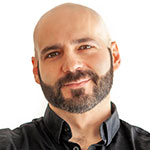 Luis María Alcázar García
Profesor de Guion transmedia e interactivo
Professor of Transmedia and interactive script
Doctor en Ciencias Sociales y Jurídicas – Comunicación por la Universidad Rey Juan Carlos. Licenciado en Ciencias de la Información por la Universidad Complutense, Experto Universitario en Animación Audiovisual por la Universidad Carlos III de Madrid, MBA de Empresas de Televisión por la Universidad de Salamanca, Máster Oficial en Comunicación Audiovisual de Servicio Público por la UNED.
Realizador para Telecinco, Real Madrid TV, Neox o Telemadrid, asesor del ICAA, creador de formatos emitidos por TVE, Telemadrid o LaSexta, responsable del contenido transmedia de series de ficción como La Peste, La Zona (ambas de Movistar+), Vota Juan (TNT), Waco (Paramount Network) o La Caza.Tramuntana (RTVE) y galardonado en los Premios Inspirational, El Sol, Agripina, The Drum, Brave Brain y Communicator, entre otros.
Luis María Alcázar García
Profesor de Guion transmedia e interactivo
Professor of Transmedia and interactive script
Doctor en Ciencias Sociales y Jurídicas – Comunicación por la Universidad Rey Juan Carlos. Licenciado en Ciencias de la Información por la Universidad Complutense, Experto Universitario en Animación Audiovisual por la Universidad Carlos III de Madrid, MBA de Empresas de Televisión por la Universidad de Salamanca, Máster Oficial en Comunicación Audiovisual de Servicio Público por la UNED.
Realizador para Telecinco, Real Madrid TV, Neox o Telemadrid, asesor del ICAA, creador de formatos emitidos por TVE, Telemadrid o LaSexta, responsable del contenido transmedia de series de ficción como La Peste, La Zona (ambas de Movistar+), Vota Juan (TNT), Waco (Paramount Network) o La Caza.Tramuntana (RTVE) y galardonado en los Premios Inspirational, El Sol, Agripina, The Drum, Brave Brain y Communicator, entre otros.
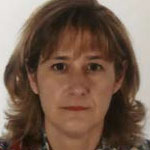 María Carmen Arroyo Rodríguez
Profesora de Desarrollo del espíritu participativo y solidario: Derechos Humanos
Professor of Development of the participatory and supportive spirit: Human Rights
Licenciada en Derecho por la Universidad Autónoma de Madrid. Colegiada ejerciente del Ilustre Colegio de Abogados de Madrid desde 1993, ejerciendo sus competencias como abogado civilista y mercantilista independiente. Es Administradora Concursal y Árbitro de la Asociación Europea de Arbitraje desde 2010 y del Consejo Arbitral de la Comunidad de Madrid desde 2018. Ha ejercido como docente dentro y fuera de España en el ámbito del Derecho Mercantil, ejerciendo como Docente de la Universidad Nebrija en el área de derecho mercantil en la Facultad de Derecho y de Relaciones Internacionales tanto en grado como en máster. Ha compatibilizado su trabajo como letrado ejerciendo funciones como Legal Counsel de empresas nacionales y multinacionales, asesorando en startup de empresas americanas en España, así como, en Due Diligence de compra de carteras financieras para las principales entidades bancarias del país.
María Carmen Arroyo Rodríguez
Profesora de Desarrollo del espíritu participativo y solidario: Derechos Humanos
Professor of Development of the participatory and supportive spirit: Human Rights
Licenciada en Derecho por la Universidad Autónoma de Madrid. Colegiada ejerciente del Ilustre Colegio de Abogados de Madrid desde 1993, ejerciendo sus competencias como abogado civilista y mercantilista independiente. Es Administradora Concursal y Árbitro de la Asociación Europea de Arbitraje desde 2010 y del Consejo Arbitral de la Comunidad de Madrid desde 2018. Ha ejercido como docente dentro y fuera de España en el ámbito del Derecho Mercantil, ejerciendo como Docente de la Universidad Nebrija en el área de derecho mercantil en la Facultad de Derecho y de Relaciones Internacionales tanto en grado como en máster. Ha compatibilizado su trabajo como letrado ejerciendo funciones como Legal Counsel de empresas nacionales y multinacionales, asesorando en startup de empresas americanas en España, así como, en Due Diligence de compra de carteras financieras para las principales entidades bancarias del país.
 Magdalena Correa Larraín
Profesora de Dirección de arte
Art Direction Professor
Doctora en fotografía y vídeo. Acreditada por ANECA. Licenciada en Bellas Artes con mención en grabado por la Universidad Católica de Chile y. Ha sido integrante de la Línea de Investigación “Aplicaciones a los Sistemas Audiovisuales y Multimedia” del Departamento de Ingeniería de la Universidad Politécnica de Cataluña, Barcelona. Se ha especializado en proyectos de investigación fotográficos y de vídeos sobre territorios aislados y desconocidos. Sus últimos proyectos han sido: “Territorios y existencias” sobre los desiertos del Gobi en China y Mongolia y el de Atacama en el Norte de Chile. Actualmente está trabajando en el proyecto “Níveo”, sobre la antártica, después de haber permanecido más de 30 días en el lugar. Además, posee una amplia actividad en exposiciones individuales y colectivas de arte contemporáneo, tanto en galerías, Museos y ferias nacionales e Internacionales.
Magdalena Correa Larraín
Profesora de Dirección de arte
Art Direction Professor
Doctora en fotografía y vídeo. Acreditada por ANECA. Licenciada en Bellas Artes con mención en grabado por la Universidad Católica de Chile y. Ha sido integrante de la Línea de Investigación “Aplicaciones a los Sistemas Audiovisuales y Multimedia” del Departamento de Ingeniería de la Universidad Politécnica de Cataluña, Barcelona. Se ha especializado en proyectos de investigación fotográficos y de vídeos sobre territorios aislados y desconocidos. Sus últimos proyectos han sido: “Territorios y existencias” sobre los desiertos del Gobi en China y Mongolia y el de Atacama en el Norte de Chile. Actualmente está trabajando en el proyecto “Níveo”, sobre la antártica, después de haber permanecido más de 30 días en el lugar. Además, posee una amplia actividad en exposiciones individuales y colectivas de arte contemporáneo, tanto en galerías, Museos y ferias nacionales e Internacionales.
 Celestino Díaz Tristán
Profesor de Diseño Web y usabilidad y Taller de proyectos digitales
Professor of Web design and usability, and Digital project workshop
Actualmente es fundador y productor ejecutivo de ViBRO, estudio creativo especializado en branded podcasts y videopodcasts.
Además, ejerce como docente y doctorando en la Universidad Nebrija.
Ha trabajado en el área digital de medios como director de Diseño de Producto (UX-UI) e Innovación, especializado en plataformas de contenidos OTT y de audio y también ha desempeñado funciones como director, presentador, redactor, realizador y productor en programas de radio y televisión en InteralmeríaTV, Cadena SER Almería, RNE, Radio 5, Radio 3 y Cadena COPE. Actualmente colabora en Las Tardes de RNE.
Es Técnico Superior en Imagen y Sonido, Licenciado en Comunicación Audiovisual, con másteres en Diseño Gráfico, Radio (RTVE) y UX-UI (Product Design).
Celestino Díaz Tristán
Profesor de Diseño Web y usabilidad y Taller de proyectos digitales
Professor of Web design and usability, and Digital project workshop
Actualmente es fundador y productor ejecutivo de ViBRO, estudio creativo especializado en branded podcasts y videopodcasts.
Además, ejerce como docente y doctorando en la Universidad Nebrija.
Ha trabajado en el área digital de medios como director de Diseño de Producto (UX-UI) e Innovación, especializado en plataformas de contenidos OTT y de audio y también ha desempeñado funciones como director, presentador, redactor, realizador y productor en programas de radio y televisión en InteralmeríaTV, Cadena SER Almería, RNE, Radio 5, Radio 3 y Cadena COPE. Actualmente colabora en Las Tardes de RNE.
Es Técnico Superior en Imagen y Sonido, Licenciado en Comunicación Audiovisual, con másteres en Diseño Gráfico, Radio (RTVE) y UX-UI (Product Design).
 Alejandro Domínguez Villa
Profesor de Contenidos aplicados en realidad virtual y Diseño de Videojuegos
Professor of Applied Content in Virtual Reality and Video Game Design
Master en desarrollo VR / AR en The Factory School
Amplia experiencia en modelado y texturizado 3D así como en la creación de entornos virtuales y generación de imágenes, renders y videos, durante mis años de práctica profesional en diferentes estudios.
He participado en el proyecto de realidad virtual llamado: Nebrija “Estela de letras” que se exhibió en la Biblioteca Nacional de España con motivo del V centenario de Antonio de Nebrija.
Formo parte como desarrollador del grupo de trabajo para la creación de un metaverso propio de la Universidad Nebrija.
He publicado diversos artículos en prensa especializada sobre arte digital, inteligencia artificial, web3.0, metaverso y realidad virtual.
Alejandro Domínguez Villa
Profesor de Contenidos aplicados en realidad virtual y Diseño de Videojuegos
Professor of Applied Content in Virtual Reality and Video Game Design
Master en desarrollo VR / AR en The Factory School
Amplia experiencia en modelado y texturizado 3D así como en la creación de entornos virtuales y generación de imágenes, renders y videos, durante mis años de práctica profesional en diferentes estudios.
He participado en el proyecto de realidad virtual llamado: Nebrija “Estela de letras” que se exhibió en la Biblioteca Nacional de España con motivo del V centenario de Antonio de Nebrija.
Formo parte como desarrollador del grupo de trabajo para la creación de un metaverso propio de la Universidad Nebrija.
He publicado diversos artículos en prensa especializada sobre arte digital, inteligencia artificial, web3.0, metaverso y realidad virtual.
 María de las Nieves Febrer Fernández
Profesora de Identidad corporativa e imagen de marca
Professor of Corporate identity and brand image
Doctora (PhD) en Comunicación Audiovisual por la Universidad de Valladolid (UVa). Acreditada por ANECA. Diploma de Estudios Avanzados (DEA) en Historia del Arte Contemporáneo (UCM), Licenciada en Bellas Artes (UCM) y Licenciada en Antropología Social y Cultural (UCM). Trabaja en diversas actividades relacionadas con las ciencias de la comunicación audiovisual, el arte contemporáneo y la fotografía. Ha publicado artículos en revistas científicas especializadas sobre estudios de género, arte, cine, fotografía, etnografía audiovisual, comunicación y antropología. Desde el año 2006, trabaja como fotógrafa y etnógrafa visual freelance.
María de las Nieves Febrer Fernández
Profesora de Identidad corporativa e imagen de marca
Professor of Corporate identity and brand image
Doctora (PhD) en Comunicación Audiovisual por la Universidad de Valladolid (UVa). Acreditada por ANECA. Diploma de Estudios Avanzados (DEA) en Historia del Arte Contemporáneo (UCM), Licenciada en Bellas Artes (UCM) y Licenciada en Antropología Social y Cultural (UCM). Trabaja en diversas actividades relacionadas con las ciencias de la comunicación audiovisual, el arte contemporáneo y la fotografía. Ha publicado artículos en revistas científicas especializadas sobre estudios de género, arte, cine, fotografía, etnografía audiovisual, comunicación y antropología. Desde el año 2006, trabaja como fotógrafa y etnógrafa visual freelance.
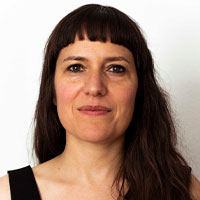 Marta Fernández Calvo
Profesora de Pensamiento creativo
Professor of Creative Thinking
Artista visual, escritora y educadora. Doctora en Bellas Artes (2023) por la Universidad de Castilla-La Mancha. Su práctica docente se desarrolla a nivel internacional en entornos educativos de Educación Superior, en instituciones artísticas, espacios culturales independientes y proyectos propios. El objetivo principal de esta práctica es promover la creatividad vinculada a la conciencia social y ecológica en el ámbito de las artes y las humanidades. En la actualidad es profesora en la Universidad Nebrija y en CIEE Madrid.
Su trabajo artístico ha formado parte de exposiciones como No Soul for Sale, en la Sala de Turbinas de la Tate Modern (Londres), Utopia Station, en la 53 Bienal de Venecia, y Querer parecer noche, en el Ca2M (Madrid). En 2019 fue residente en Delfina Foundation (Londres) en el marco del programa Politics of Food. Sus colaboraciones más recientes han tenido lugar en Artium (Vitoria), Fundación Botín (Santander), Kunsthalle Exnergasse (Viena) y Bienal de Pontevedra. En 2024 fue residente del Centro de Residencias Artísticas de Matadero (Madrid). En la actualidad está trabajando en una revisión de su práctica artística a través de la escritura en el marco del proyecto The GOAT Polity of Literature (Canadá). Acaba de recibir el premio The GOAT Modest Award 2024 por sus dos primeros relatos: Sleeping Lion y Bonsai Pine
Marta Fernández Calvo
Profesora de Pensamiento creativo
Professor of Creative Thinking
Artista visual, escritora y educadora. Doctora en Bellas Artes (2023) por la Universidad de Castilla-La Mancha. Su práctica docente se desarrolla a nivel internacional en entornos educativos de Educación Superior, en instituciones artísticas, espacios culturales independientes y proyectos propios. El objetivo principal de esta práctica es promover la creatividad vinculada a la conciencia social y ecológica en el ámbito de las artes y las humanidades. En la actualidad es profesora en la Universidad Nebrija y en CIEE Madrid.
Su trabajo artístico ha formado parte de exposiciones como No Soul for Sale, en la Sala de Turbinas de la Tate Modern (Londres), Utopia Station, en la 53 Bienal de Venecia, y Querer parecer noche, en el Ca2M (Madrid). En 2019 fue residente en Delfina Foundation (Londres) en el marco del programa Politics of Food. Sus colaboraciones más recientes han tenido lugar en Artium (Vitoria), Fundación Botín (Santander), Kunsthalle Exnergasse (Viena) y Bienal de Pontevedra. En 2024 fue residente del Centro de Residencias Artísticas de Matadero (Madrid). En la actualidad está trabajando en una revisión de su práctica artística a través de la escritura en el marco del proyecto The GOAT Polity of Literature (Canadá). Acaba de recibir el premio The GOAT Modest Award 2024 por sus dos primeros relatos: Sleeping Lion y Bonsai Pine
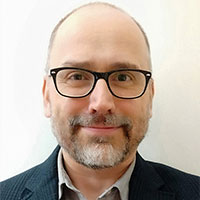 Fausto Galindo Matas
Profesor de Tratamiento y retoque digital en la imagen
Professor of digital image treatment and retouching
Licenciado en Ciencias de la Información por la Universidad Complutense de Madrid (1998). Diplomado en Cine de Animación por la Escuela de Cine de Madrid-ECAM (2002).
Desarrolla su labor docente en ámbitos de diseño gráfico, motion graphics y animación, impartiendo diversas asignaturas en grados y másteres universitarios. Entre los centros en los que ha sido docente, se encuentran Universidad Nebrija, CEU San Pablo, UNIR, Istituto Europeo di Design (IED) o Centro de Artes TAI.
En el ámbito profesional, ha colaborado como freelance con numerosas empresas en las especialidades de diseño gráfico, motion graphics e ilustración.
Responsable de grafismo en la productora La Fábrica de la Tele, desarrolló allí numerosas gráficas de programas de televisión para el grupo Mediaset.
También ha trabajado como animador y motion grapher en largometrajes como El Cid, La Leyenda, RH+, el Vampiro de Sevilla, Control Room o Gora Automatikoa.
Fausto Galindo Matas
Profesor de Tratamiento y retoque digital en la imagen
Professor of digital image treatment and retouching
Licenciado en Ciencias de la Información por la Universidad Complutense de Madrid (1998). Diplomado en Cine de Animación por la Escuela de Cine de Madrid-ECAM (2002).
Desarrolla su labor docente en ámbitos de diseño gráfico, motion graphics y animación, impartiendo diversas asignaturas en grados y másteres universitarios. Entre los centros en los que ha sido docente, se encuentran Universidad Nebrija, CEU San Pablo, UNIR, Istituto Europeo di Design (IED) o Centro de Artes TAI.
En el ámbito profesional, ha colaborado como freelance con numerosas empresas en las especialidades de diseño gráfico, motion graphics e ilustración.
Responsable de grafismo en la productora La Fábrica de la Tele, desarrolló allí numerosas gráficas de programas de televisión para el grupo Mediaset.
También ha trabajado como animador y motion grapher en largometrajes como El Cid, La Leyenda, RH+, el Vampiro de Sevilla, Control Room o Gora Automatikoa.
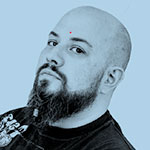 Sergio García Cabezas
Profesor de Arquitectura Web
Professor of Website Architecture
Doctor en Educación ha compaginado su labor docente en el Centro Universitario La Salle, Universidad Francisco de Vitoria con su trayectoria profesional ha trabajado como CEO en Tranmediarte, Productor en Betterword o Director de contenidos transmedia en Possible Lab entre otros, esta labor profesional ha sido compaginada también con la de Consultor para grandes organizaciones en materia de tecnología, diseño, accesibilidad y narrativa transmedia unesco, OEI, RIINEE, Red Tucana, Gobierno de Chile entre otras.
Entre su Proyectos web destacan https://labpossible.com; https://vestaliaasociados.es/; https://transmediarte.com/; https://betterworldgame.com/; https://makermania.es/; https://www.lasallecentrouniversitario.es/;https://mineacademy.es/;https://somosamafi.es/
Sergio García Cabezas
Profesor de Arquitectura Web
Professor of Website Architecture
Doctor en Educación ha compaginado su labor docente en el Centro Universitario La Salle, Universidad Francisco de Vitoria con su trayectoria profesional ha trabajado como CEO en Tranmediarte, Productor en Betterword o Director de contenidos transmedia en Possible Lab entre otros, esta labor profesional ha sido compaginada también con la de Consultor para grandes organizaciones en materia de tecnología, diseño, accesibilidad y narrativa transmedia unesco, OEI, RIINEE, Red Tucana, Gobierno de Chile entre otras.
Entre su Proyectos web destacan https://labpossible.com; https://vestaliaasociados.es/; https://transmediarte.com/; https://betterworldgame.com/; https://makermania.es/; https://www.lasallecentrouniversitario.es/;https://mineacademy.es/;https://somosamafi.es/
 Luis Gárciga Romay
Profesor de desarrollo de las capacidades en la empresa
Professor of business capacity development
Ha impartido docencia, conferencias y ponencias en Universidad Nacional de Colombia, la Universidad Complutense de Madrid, la Academia Nacional San Alejandro, el Instituto Superior de Arte de La Habana, Centro Nacional de Investigación, Documentación e Información de Artes Plásticas del Instituto Nacional de Bellas Artes (México), la Escuela Superior de Arte de Yucatán, la Universidad Autónoma Metropolitana (México), la Universidad de Costa Rica y el Centro Cultural de España (Costa Rica). Coordinador del Laboratorio de Actualización Docente de UVA- CCU Tlatelolco de la Universidad Nacional Autónoma de México. Algunos de sus proyectos artísticos han sido exhibidos en Bienal de Mercosur (Brasil), Bienal de La Habana (Cuba), Bienal de las Américas (USA), Bienal de Santa Cruz de la Sierra (Bolivia), Instituto Cervantes (Holanda), Museo Nacional de Bellas Artes de Cuba, Festival Loop (Barcelona), Matadero de Madrid (España), San Francisco Art Institute (CA, USA), MUCA Roma (Ciudad México), Queen Museum of Art (NY, USA), Instituto de Arte de Grenoble (Francia), Beijing Today Art Museum (China). Su obra se encuentra en colecciones públicas y privadas como Daros Latinoamerica (Suiza), Museo Nacional de Bellas Artes de Cuba, Art Now International Foundation. Kadist Foundation (USA-Francia), Mediateca Caixa Forum de Barcelona (España), Habana Cultura de Habana Club (Cuba-Francia). Ha recibido becas y reconocimientos como: Artista en Residencia de Universidad Antonio Nebrija (2022), Ayuda PICE para la Internacionalización de la Cultura Española (2019), Residencia Artística para Creadores de Iberoamérica en México (2014), Premio Museo Nacional de Bellas Artes de Cuba, Premio Centro de Arte Contemporáneo Wifredo Lam de Cuba (2010) y Premio de Comisariado de la AECID, España/Cuba (2005).
Luis Gárciga Romay
Profesor de desarrollo de las capacidades en la empresa
Professor of business capacity development
Ha impartido docencia, conferencias y ponencias en Universidad Nacional de Colombia, la Universidad Complutense de Madrid, la Academia Nacional San Alejandro, el Instituto Superior de Arte de La Habana, Centro Nacional de Investigación, Documentación e Información de Artes Plásticas del Instituto Nacional de Bellas Artes (México), la Escuela Superior de Arte de Yucatán, la Universidad Autónoma Metropolitana (México), la Universidad de Costa Rica y el Centro Cultural de España (Costa Rica). Coordinador del Laboratorio de Actualización Docente de UVA- CCU Tlatelolco de la Universidad Nacional Autónoma de México. Algunos de sus proyectos artísticos han sido exhibidos en Bienal de Mercosur (Brasil), Bienal de La Habana (Cuba), Bienal de las Américas (USA), Bienal de Santa Cruz de la Sierra (Bolivia), Instituto Cervantes (Holanda), Museo Nacional de Bellas Artes de Cuba, Festival Loop (Barcelona), Matadero de Madrid (España), San Francisco Art Institute (CA, USA), MUCA Roma (Ciudad México), Queen Museum of Art (NY, USA), Instituto de Arte de Grenoble (Francia), Beijing Today Art Museum (China). Su obra se encuentra en colecciones públicas y privadas como Daros Latinoamerica (Suiza), Museo Nacional de Bellas Artes de Cuba, Art Now International Foundation. Kadist Foundation (USA-Francia), Mediateca Caixa Forum de Barcelona (España), Habana Cultura de Habana Club (Cuba-Francia). Ha recibido becas y reconocimientos como: Artista en Residencia de Universidad Antonio Nebrija (2022), Ayuda PICE para la Internacionalización de la Cultura Española (2019), Residencia Artística para Creadores de Iberoamérica en México (2014), Premio Museo Nacional de Bellas Artes de Cuba, Premio Centro de Arte Contemporáneo Wifredo Lam de Cuba (2010) y Premio de Comisariado de la AECID, España/Cuba (2005).
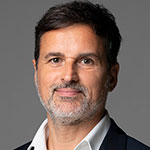 José Luis Guijarro Alonso
Profesor de Historia del Diseño Visual
Professor of History of Visual Design
Doctor en Historia del Arte por la Universidad Complutense de Madrid, MA Art Business por la Universidad de Manchester y el Sotheby’s Institute of Art de Londres y Máster en Historia del Arte y Cultura Visual por la Universidad Autónoma de Madrid. Es Licenciado en Historia del Arte y en Antropología Social y Cultural por la U. Complutense y en Administración de Empresas y en Ciencias Actuariales y Financieras por la U. Carlos III de Madrid. Es co-fundador y director de Programa Taide y 57 org, organizaciones con la misión de apoyar e impulsar el trabajo de artistas visuales y performativos tanto en España como en el contexto internacional. Con anterioridad, ha trabajado para el Departamento Postwar and Contemporary de Christie’s en Londres y ha sido Director de Valoraciones y Curatorial de Mutualart. Entre 1999 y 2009, José Luis trabajó como responsable de Control de Gestión Financiera en Grupo Ferrovial. En el ámbito académico es Director del Máster en Mercado de Arte y Gestión de Empresas Relacionadas en la Universidad Nebrija, donde imparte Mercado Primario: galerías y ferias, Cuestiones de Economía del arte, tutor del Trabajo fin de Máster, además de impartir Historia del Diseño Visual en el Grado en Diseño Digital y Multimedia.
José Luis Guijarro Alonso
Profesor de Historia del Diseño Visual
Professor of History of Visual Design
Doctor en Historia del Arte por la Universidad Complutense de Madrid, MA Art Business por la Universidad de Manchester y el Sotheby’s Institute of Art de Londres y Máster en Historia del Arte y Cultura Visual por la Universidad Autónoma de Madrid. Es Licenciado en Historia del Arte y en Antropología Social y Cultural por la U. Complutense y en Administración de Empresas y en Ciencias Actuariales y Financieras por la U. Carlos III de Madrid. Es co-fundador y director de Programa Taide y 57 org, organizaciones con la misión de apoyar e impulsar el trabajo de artistas visuales y performativos tanto en España como en el contexto internacional. Con anterioridad, ha trabajado para el Departamento Postwar and Contemporary de Christie’s en Londres y ha sido Director de Valoraciones y Curatorial de Mutualart. Entre 1999 y 2009, José Luis trabajó como responsable de Control de Gestión Financiera en Grupo Ferrovial. En el ámbito académico es Director del Máster en Mercado de Arte y Gestión de Empresas Relacionadas en la Universidad Nebrija, donde imparte Mercado Primario: galerías y ferias, Cuestiones de Economía del arte, tutor del Trabajo fin de Máster, además de impartir Historia del Diseño Visual en el Grado en Diseño Digital y Multimedia.
 Almudena Gómiz Macein
Profesora de Propiedad intelectual y protección de datos
Professor of Intellectual Property and data protection
Doctoranda en Ciencias Jurídicas y Sociales por la Universidad de Málaga. Licenciada en Derecho por la Universidad Complutense de Madrid. Graduado Superior en Ciencias del Patrimonio especialidad en Protección y Gestión por la Universidad SEK. Experta Universitaria en Fundaciones, aspectos jurídicos y fiscales, por la UNED. Máster en Seguridad y Defensa por la Universidad NEBRIJA. Curso de Patrimonio Marítimo Europeo de la Cátedra Europea Jean Monnet Maritimum por la Universidad de Murcia.
Abogado ejerciente, colegiada desde 1.990 en I.C.A.M. Socia fundadora de ALARTE ABOGADOS despacho especializado y dedicado al sector cultural, para clientes nacionales e internacionales, donde actualmente desempeña su trabajo de abogado y directora de la firma.
Profesora asociada en la Facultad de Derecho de la Universidad Complutense de Madrid en Grado de Derecho y Máster de Acceso a la Abogacía. Dirección TFG y TFM y Tribunales de Defensa.
Profesora en la Facultad de Derecho de la Universidad Antonio de Nebrija, en Grado de Derecho y en el Máster de Acceso a la Abogacía, así como en el Máster de Mercado del Arte y Gestión de empresas relacionadas. Dirección de TFG Y TFM y Tribunales de Defensa.
Organizadora y ponente en cursos de formación, congresos, charlas, jornadas y mesas redondas impartidos en instituciones de diversa índole. Publicación de artículos y ponencias en materia de regulación jurídica y ejercicio de la abogacía
Almudena Gómiz Macein
Profesora de Propiedad intelectual y protección de datos
Professor of Intellectual Property and data protection
Doctoranda en Ciencias Jurídicas y Sociales por la Universidad de Málaga. Licenciada en Derecho por la Universidad Complutense de Madrid. Graduado Superior en Ciencias del Patrimonio especialidad en Protección y Gestión por la Universidad SEK. Experta Universitaria en Fundaciones, aspectos jurídicos y fiscales, por la UNED. Máster en Seguridad y Defensa por la Universidad NEBRIJA. Curso de Patrimonio Marítimo Europeo de la Cátedra Europea Jean Monnet Maritimum por la Universidad de Murcia.
Abogado ejerciente, colegiada desde 1.990 en I.C.A.M. Socia fundadora de ALARTE ABOGADOS despacho especializado y dedicado al sector cultural, para clientes nacionales e internacionales, donde actualmente desempeña su trabajo de abogado y directora de la firma.
Profesora asociada en la Facultad de Derecho de la Universidad Complutense de Madrid en Grado de Derecho y Máster de Acceso a la Abogacía. Dirección TFG y TFM y Tribunales de Defensa.
Profesora en la Facultad de Derecho de la Universidad Antonio de Nebrija, en Grado de Derecho y en el Máster de Acceso a la Abogacía, así como en el Máster de Mercado del Arte y Gestión de empresas relacionadas. Dirección de TFG Y TFM y Tribunales de Defensa.
Organizadora y ponente en cursos de formación, congresos, charlas, jornadas y mesas redondas impartidos en instituciones de diversa índole. Publicación de artículos y ponencias en materia de regulación jurídica y ejercicio de la abogacía
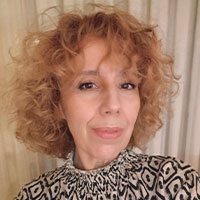 Marta González Caballero
Profesora de Narrativa Audiovisual
Professor of Audiovisual Narrative
Doctora en Comunicación Audiovisual por la UCM. Acreditada por ANECA y Licenciada en Ciencias de la Información por la misma Universidad. Diplomada en el CAP por la Facultad de Ciencias de la Educación, con especialización en Didáctica de los medios audiovisuales. Profesora Universitaria desde 1998, ha realizado su labor docente en universidades públicas y privadas y en la Escuela de Cinematografía y del Audiovisual de la Comunidad de Madrid (ECAM). Ha trabajado como operadora de cámara en el Congreso de los Diputados y en los Servicios informativos de TVE. Ha desarrollado gran parte de su experiencia profesional en el ámbito de la producción audiovisual para “M&m Producciones”, realizando piezas publicitarias, videoclips y proyectos multimedia. Desde hace dos años, colabora con el Estudio de diseño Dynarange como Audiovisual Manager en Organización de eventos. Ha realizado colaboraciones para Editorial Scriptum y para JC Libros de cine.
Marta González Caballero
Profesora de Narrativa Audiovisual
Professor of Audiovisual Narrative
Doctora en Comunicación Audiovisual por la UCM. Acreditada por ANECA y Licenciada en Ciencias de la Información por la misma Universidad. Diplomada en el CAP por la Facultad de Ciencias de la Educación, con especialización en Didáctica de los medios audiovisuales. Profesora Universitaria desde 1998, ha realizado su labor docente en universidades públicas y privadas y en la Escuela de Cinematografía y del Audiovisual de la Comunidad de Madrid (ECAM). Ha trabajado como operadora de cámara en el Congreso de los Diputados y en los Servicios informativos de TVE. Ha desarrollado gran parte de su experiencia profesional en el ámbito de la producción audiovisual para “M&m Producciones”, realizando piezas publicitarias, videoclips y proyectos multimedia. Desde hace dos años, colabora con el Estudio de diseño Dynarange como Audiovisual Manager en Organización de eventos. Ha realizado colaboraciones para Editorial Scriptum y para JC Libros de cine.
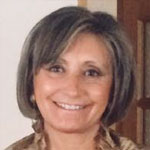 María Dolores López Faraldos
Profesora de Desarrollo del espíritu participativo y solidario: Derechos Humanos.
Professor of Development of the spirit of participation and solidarity: Human Rights.
Licenciada en Derecho por la Universidad Complutense de Madrid. Diplomada como Abogado del S. Tribunal de La Rota de la Nunciatura Apostólica. Mediadora de la Fundación Notarial Signun, para la resolución Alternativa de Conflictos. Abogado en ejercicio perteneciente al Ilustre Colegio de Abogados de Madrid (ICAM) desde 1983, momento en el que empieza su proyecto profesional y establece su propio Despacho en Madrid. Desde entonces viene prestando sus servicios profesionales tanto en el ámbito del Derecho privado para particulares, como en el ámbito de Derecho Público para Entidades públicas. Especializada en Derecho Civil, Derecho Penal y Derecho Procesal. Asesora Jurídica de pequeños y medianos empresarios de Madrid. Desde 2006, hasta la actualidad, Asesora Jurídica del Ayuntamiento de Tres Cantos en distintas Concejalías. Integrante del Equipo de Mediadores de la Fundación Notarial Signum (FNS), a la que pertenece desde 2014. Ha participado en numerosos Proyectos de Mediación de la FNS y el CGPJ para la implantación y difusión de los ADRs en los Juzgados de la Comunidad de Madrid. En la actualidad es la Coordinadora del Proyecto de Mediación Penal que la FNS mantiene con la Audiencia Provincial de Madrid. Su actividad como Jurista la ha desempeñado ante NNUU, asistiendo y participando en la 39, 40, 45 y 50, Sesiones de la Comisión sobre el Estado de la Mujer, en las NNUU. Nueva York, como representante y Presidenta de la Asociación Española de Mujeres Juristas.
María Dolores López Faraldos
Profesora de Desarrollo del espíritu participativo y solidario: Derechos Humanos.
Professor of Development of the spirit of participation and solidarity: Human Rights.
Licenciada en Derecho por la Universidad Complutense de Madrid. Diplomada como Abogado del S. Tribunal de La Rota de la Nunciatura Apostólica. Mediadora de la Fundación Notarial Signun, para la resolución Alternativa de Conflictos. Abogado en ejercicio perteneciente al Ilustre Colegio de Abogados de Madrid (ICAM) desde 1983, momento en el que empieza su proyecto profesional y establece su propio Despacho en Madrid. Desde entonces viene prestando sus servicios profesionales tanto en el ámbito del Derecho privado para particulares, como en el ámbito de Derecho Público para Entidades públicas. Especializada en Derecho Civil, Derecho Penal y Derecho Procesal. Asesora Jurídica de pequeños y medianos empresarios de Madrid. Desde 2006, hasta la actualidad, Asesora Jurídica del Ayuntamiento de Tres Cantos en distintas Concejalías. Integrante del Equipo de Mediadores de la Fundación Notarial Signum (FNS), a la que pertenece desde 2014. Ha participado en numerosos Proyectos de Mediación de la FNS y el CGPJ para la implantación y difusión de los ADRs en los Juzgados de la Comunidad de Madrid. En la actualidad es la Coordinadora del Proyecto de Mediación Penal que la FNS mantiene con la Audiencia Provincial de Madrid. Su actividad como Jurista la ha desempeñado ante NNUU, asistiendo y participando en la 39, 40, 45 y 50, Sesiones de la Comisión sobre el Estado de la Mujer, en las NNUU. Nueva York, como representante y Presidenta de la Asociación Española de Mujeres Juristas.
 Emilio López-Galiacho Carrilero
Profesor de Modelado y texturizado 3D
Professor of 3D modeling and texturing
Arquitecto y doctor en arquitectura por la Universidad Politécnica de Madrid. Acreditado por ANECA. Desde 1992 su trabajo ha transcurrido en las intersecciones entre arte, arquitectura y tecnología, compaginando proyectos artísticos, producción sonora, docencia e investigación. Ha mostrado su trabajo en España, Austria, México, Suecia y Japón, y ha colaborado asiduamente con los artistas Rafael Lozano-Hemmer y Daniel Canogar. Además de en la Universidad Nebrija (Grados de Bellas Artes, Fundamentos de la Arquitectura y Diseño Industrial), es profesor asociado en ESNE (Escuela Universitaria de Diseño, Innovación y Tecnología) y en el Master de Postgrado en Comunicación Arquitectónica (MAca) de la ETSAM. Es miembro del Grupo de Investigación ETCC (Estudios Transversales en Creación Contemporánea) en la Universidad Nebrija de Madrid y del Grupo de Investigación Hypermedia en la ETSAM. Mantiene el blog “La creación compatible” en la revista digital FronteraD, de la que es subdirector y director de arte. Actualmente trabaja en dos líneas de investigación: por un lado, los interfaces emocionales, la neo-materialidad telemática y el reencantamiento post-digital del espacio, el cuerpo y los objetos, y por el otro, la arquitectónica de lo virtual/actual y su presencia en los procesos creativos.
Emilio López-Galiacho Carrilero
Profesor de Modelado y texturizado 3D
Professor of 3D modeling and texturing
Arquitecto y doctor en arquitectura por la Universidad Politécnica de Madrid. Acreditado por ANECA. Desde 1992 su trabajo ha transcurrido en las intersecciones entre arte, arquitectura y tecnología, compaginando proyectos artísticos, producción sonora, docencia e investigación. Ha mostrado su trabajo en España, Austria, México, Suecia y Japón, y ha colaborado asiduamente con los artistas Rafael Lozano-Hemmer y Daniel Canogar. Además de en la Universidad Nebrija (Grados de Bellas Artes, Fundamentos de la Arquitectura y Diseño Industrial), es profesor asociado en ESNE (Escuela Universitaria de Diseño, Innovación y Tecnología) y en el Master de Postgrado en Comunicación Arquitectónica (MAca) de la ETSAM. Es miembro del Grupo de Investigación ETCC (Estudios Transversales en Creación Contemporánea) en la Universidad Nebrija de Madrid y del Grupo de Investigación Hypermedia en la ETSAM. Mantiene el blog “La creación compatible” en la revista digital FronteraD, de la que es subdirector y director de arte. Actualmente trabaja en dos líneas de investigación: por un lado, los interfaces emocionales, la neo-materialidad telemática y el reencantamiento post-digital del espacio, el cuerpo y los objetos, y por el otro, la arquitectónica de lo virtual/actual y su presencia en los procesos creativos.
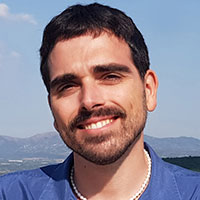 Diego Mayoral Martín
Profesor de Diseño de portafolio
Professor of Portfolio Design
Artista, investigador y docente. Licenciado en Bellas Artes e Historia del Arte por la USAL y Doctor en Historia del Arte por la UAM. Posee varios másteres en materia de Dirección Artística, Historia del Arte Contemporáneo, Práctica Escénica, Profesorado y Diseño Gráfico. Su investigación teórico-práctica se enfoca principalmente a la historia del arte, la cultura visual, las artes vivas, la teoría de género y la espiritualidad y las religiones comparadas.
Diego Mayoral Martín
Profesor de Diseño de portafolio
Professor of Portfolio Design
Artista, investigador y docente. Licenciado en Bellas Artes e Historia del Arte por la USAL y Doctor en Historia del Arte por la UAM. Posee varios másteres en materia de Dirección Artística, Historia del Arte Contemporáneo, Práctica Escénica, Profesorado y Diseño Gráfico. Su investigación teórico-práctica se enfoca principalmente a la historia del arte, la cultura visual, las artes vivas, la teoría de género y la espiritualidad y las religiones comparadas.
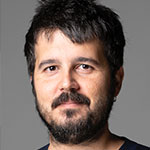 Acoidán Méndez Jiménez
Profesor de Storyline y guion aplicado
Professor of Storyline and script applied
Graduado en Comunicación Audiovisual por la Universidad Rey Juan Carlos y Master en Guion de Cine y Series de Televisión por la misma universidad. Fundador de la productora Ficciono, proyecto audiovisual basado en el storytelling con el que trabaja para instituciones como la ONCE, la Universidad de Las Palmas de Gran Canaria o el Congreso Internacional de energías nucleares IYNC.
Acoidán Méndez Jiménez
Profesor de Storyline y guion aplicado
Professor of Storyline and script applied
Graduado en Comunicación Audiovisual por la Universidad Rey Juan Carlos y Master en Guion de Cine y Series de Televisión por la misma universidad. Fundador de la productora Ficciono, proyecto audiovisual basado en el storytelling con el que trabaja para instituciones como la ONCE, la Universidad de Las Palmas de Gran Canaria o el Congreso Internacional de energías nucleares IYNC.
 Victoria Isabel Moreno Gil
Profesora de Nuevas Tecnologías y Sociedad de la Información
Professor of New Technologies and Information Society
Doctora en Periodismo. Acreditada por ANECA. Licenciada en Periodismo y Comunicación Audiovisual.
Su trayectoria profesional está ligada a la docencia y al ejercicio del periodismo en distintos medios de comunicación como redactora: principalmente en televisión (El Mundo TV, Intereconomía), pero también en radio (Cadena Ser), agencia de noticias (EFE) y medios digitales. Asimismo, cuenta con una dilatada experiencia en la cobertura de eventos mediáticos, elaboración de guiones y reportajes audiovisuales como freelance.
Combina su labor docente con la de investigadora en el campo de la ética periodística y la alfabetización mediática. Ha participado como ponente en distintos seminarios académicos y, recientemente, ha realizado una estancia postdoctoral en calidad de profesora visitante.
En el marco de la educación no formal, ha impartido clases de Inglés y de Lengua y Literatura.
Victoria Isabel Moreno Gil
Profesora de Nuevas Tecnologías y Sociedad de la Información
Professor of New Technologies and Information Society
Doctora en Periodismo. Acreditada por ANECA. Licenciada en Periodismo y Comunicación Audiovisual.
Su trayectoria profesional está ligada a la docencia y al ejercicio del periodismo en distintos medios de comunicación como redactora: principalmente en televisión (El Mundo TV, Intereconomía), pero también en radio (Cadena Ser), agencia de noticias (EFE) y medios digitales. Asimismo, cuenta con una dilatada experiencia en la cobertura de eventos mediáticos, elaboración de guiones y reportajes audiovisuales como freelance.
Combina su labor docente con la de investigadora en el campo de la ética periodística y la alfabetización mediática. Ha participado como ponente en distintos seminarios académicos y, recientemente, ha realizado una estancia postdoctoral en calidad de profesora visitante.
En el marco de la educación no formal, ha impartido clases de Inglés y de Lengua y Literatura.
 Ramon Ortega Lozano
Profesor de Escritura creativa
Professor of creative writing
Ramón Ortega Lozano (México D.F. 11 de agosto de 1979) también conocido por su nombre artístico Ramón Ortega (tres) es un escritor mexicano, profesor y especialista del mundo de la literatura, la escritura creativa y temas relacionados con las humanidades médicas (antropología de la salud, historia y filosofía de la medicina, comunicación médico-paciente y bioética). Ha colaborado con diversos centros universitarios en España y otros países de Europa, así como México.
En la actualidad es profesor de comunicación humana y técnicas de expresión escrita y de Antropología de la salud en el Centro Universitario San Rafael-Nebrija. Da clases de literatura en el Centro de Estudios Hispánicos de la Universidad Nebrija. Colabora en distintas actividades tanto académicas, divulgativas y de investigación con el Instituto de Ética Clínica Francisco Vallés-Universidad Europea. También ha impartido clases escritura creativa y competencias profesionales en otros centros universitarios.
Es doctor en Filosofía de la Ciencia por la Universidad Complutense de Madrid con la tesis doctoral: Walter Bradford Cannon: la institucionalización de la fisiología en la Universidad de Harvard durante la segunda mitad del siglo XIX y los comienzos del siglo XX. Licenciado en Comunicación Audiovisual y en Humanidades por la Universidad Europea de Madrid.
Ha colaborado con actividades docentes en la Universidad Nebrija, en el Centro Universitario TAI (adscrito a la Universidad Rey Juan Carlos), en la Universidad del Valle de México (México), en al Universidad Europea de Madrid, en Fontys University of Applied Sciences (Holanda) y en Deggendorf University of Applied Sciences (Alemania).
Ha publicado artículos de diversos temas (literatura, filosofía, divulgación científica, ficción, etc.) en distintos medios. Ha escrito una compilación de relatos llamada Un gran salto para Gorsky que puede descargarse de internet. También es autor de El anecdotario de un Breaking up (novela fragmentada e inédita) y un pequeño poemario (inédito). Cuenta con un blog llamado Cuando el hoy comienza a ser ayer.
Ramon Ortega Lozano
Profesor de Escritura creativa
Professor of creative writing
Ramón Ortega Lozano (México D.F. 11 de agosto de 1979) también conocido por su nombre artístico Ramón Ortega (tres) es un escritor mexicano, profesor y especialista del mundo de la literatura, la escritura creativa y temas relacionados con las humanidades médicas (antropología de la salud, historia y filosofía de la medicina, comunicación médico-paciente y bioética). Ha colaborado con diversos centros universitarios en España y otros países de Europa, así como México.
En la actualidad es profesor de comunicación humana y técnicas de expresión escrita y de Antropología de la salud en el Centro Universitario San Rafael-Nebrija. Da clases de literatura en el Centro de Estudios Hispánicos de la Universidad Nebrija. Colabora en distintas actividades tanto académicas, divulgativas y de investigación con el Instituto de Ética Clínica Francisco Vallés-Universidad Europea. También ha impartido clases escritura creativa y competencias profesionales en otros centros universitarios.
Es doctor en Filosofía de la Ciencia por la Universidad Complutense de Madrid con la tesis doctoral: Walter Bradford Cannon: la institucionalización de la fisiología en la Universidad de Harvard durante la segunda mitad del siglo XIX y los comienzos del siglo XX. Licenciado en Comunicación Audiovisual y en Humanidades por la Universidad Europea de Madrid.
Ha colaborado con actividades docentes en la Universidad Nebrija, en el Centro Universitario TAI (adscrito a la Universidad Rey Juan Carlos), en la Universidad del Valle de México (México), en al Universidad Europea de Madrid, en Fontys University of Applied Sciences (Holanda) y en Deggendorf University of Applied Sciences (Alemania).
Ha publicado artículos de diversos temas (literatura, filosofía, divulgación científica, ficción, etc.) en distintos medios. Ha escrito una compilación de relatos llamada Un gran salto para Gorsky que puede descargarse de internet. También es autor de El anecdotario de un Breaking up (novela fragmentada e inédita) y un pequeño poemario (inédito). Cuenta con un blog llamado Cuando el hoy comienza a ser ayer.
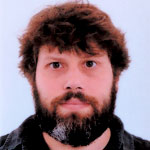 Alejandro Priego Díaz
Profesor de Postproducción
Professor of Postproduction
Licenciado en Comunicación Audiovisual por la Universidad Rey Juan Carlos I. Profesor colaborador en la Facultad de Ciencias de la Información de la Universidad Complutense. En la actualidad, su trabajo profesional está centrado en la realización, edición y postproducción de vídeo para distintas productoras y canales de televisión (Plural Entertainment España, Bainet Media, Zebra Producciones, Globomedia, Mediapro, Trímboli, SCM-Medialab, Antena 3, La Sexta, Canal +, Telemadrid, TVE, Canal Extremadura, Aragon TV, EsMadridTV y Telecinco), en programas como Alaska y Mario, Los documentos de ‘La catedral del mar’, Generación Nini, Dragolandia, Sex Mundi (Serie documental para El País y el canal Odisea), El Internado, Desafío Ben 10 (Boing), Gourmetmanía, 52 Minutos, Los Viernes al Show o Callejeros.
Alejandro Priego Díaz
Profesor de Postproducción
Professor of Postproduction
Licenciado en Comunicación Audiovisual por la Universidad Rey Juan Carlos I. Profesor colaborador en la Facultad de Ciencias de la Información de la Universidad Complutense. En la actualidad, su trabajo profesional está centrado en la realización, edición y postproducción de vídeo para distintas productoras y canales de televisión (Plural Entertainment España, Bainet Media, Zebra Producciones, Globomedia, Mediapro, Trímboli, SCM-Medialab, Antena 3, La Sexta, Canal +, Telemadrid, TVE, Canal Extremadura, Aragon TV, EsMadridTV y Telecinco), en programas como Alaska y Mario, Los documentos de ‘La catedral del mar’, Generación Nini, Dragolandia, Sex Mundi (Serie documental para El País y el canal Odisea), El Internado, Desafío Ben 10 (Boing), Gourmetmanía, 52 Minutos, Los Viernes al Show o Callejeros.
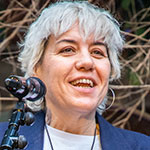 Mª del Mar Ramos Rodríguez
Profesora de Desarrollo de las capacidades en la empresa / Coordinadora de prácticas de la FCA, Tipografía
Professor of Business Skills Development / FCA Internship Coordinator, Typography
Doctora en Bellas Artes por la Universidad Complutense de Madrid. Licenciada en Ciencias de la Imagen y Sonido por la misma universidad. Su práctica profesional se ha desarrollado en el mundo de la fotografía, la producción audiovisual y el diseño gráfico y editorial. Destaca su experiencia laboral en el mundo de la publicidad cinematográfica, en estudios de diseño y en la productora cinematográfica CineCompany, así como en las empresas de comunicación editorial Grupo Zeta y Vocento. En la Universidad de Nebrija imparte docencia desde 1998 en programas de grado y postgrado en las áreas de Comunicación Audiovisual, Periodismo y Publicidad al tiempo que lo compagina con proyectos gráficos y audiovisuales para empresas e instituciones. Desde el año 2022 es la coordinadora académica de Prácticas de la Facultad de Comunicación y Artes.
Mª del Mar Ramos Rodríguez
Profesora de Desarrollo de las capacidades en la empresa / Coordinadora de prácticas de la FCA, Tipografía
Professor of Business Skills Development / FCA Internship Coordinator, Typography
Doctora en Bellas Artes por la Universidad Complutense de Madrid. Licenciada en Ciencias de la Imagen y Sonido por la misma universidad. Su práctica profesional se ha desarrollado en el mundo de la fotografía, la producción audiovisual y el diseño gráfico y editorial. Destaca su experiencia laboral en el mundo de la publicidad cinematográfica, en estudios de diseño y en la productora cinematográfica CineCompany, así como en las empresas de comunicación editorial Grupo Zeta y Vocento. En la Universidad de Nebrija imparte docencia desde 1998 en programas de grado y postgrado en las áreas de Comunicación Audiovisual, Periodismo y Publicidad al tiempo que lo compagina con proyectos gráficos y audiovisuales para empresas e instituciones. Desde el año 2022 es la coordinadora académica de Prácticas de la Facultad de Comunicación y Artes.
 Pedro Juan Sánchez Bermejo
Profesor de Animación 2D y 3D y Articulación de personajes (Rigging)
Professor of 2D and 3D Animation and Character Articulation (Rigging)
Doctor en Escultura por la Universidad Complutense de Madrid y licenciado en Bellas Artes con la especialidad en Diseño por la misma universidad.
Especialista en producción audiovisual con Autodesk Maya, su experiencia profesional se ha desarrollado como fotógrafo profesional y diseñador gráfico. También ha sido coordinador, diseñador editorial y Director de Arte en varias empresas de Diseño Web, desarrollando líneas de diseño y guías de estilo. Ha desempeñado funciones de Editor ejecutivo multimedia en el Grupo Santillana de educación, Jefe de Producción Multimedia en Oxford University Press o Repsol-YPF.
Ha sido profesor de diferentes disciplinas en diferentes centros de formación y universidades. Actualmente compagina su labor docente con su trabajo como freelance de Diseño, 3D y multimedia, gestión y producción de proyectos digitales y escultor y animador digital.
Pedro Juan Sánchez Bermejo
Profesor de Animación 2D y 3D y Articulación de personajes (Rigging)
Professor of 2D and 3D Animation and Character Articulation (Rigging)
Doctor en Escultura por la Universidad Complutense de Madrid y licenciado en Bellas Artes con la especialidad en Diseño por la misma universidad.
Especialista en producción audiovisual con Autodesk Maya, su experiencia profesional se ha desarrollado como fotógrafo profesional y diseñador gráfico. También ha sido coordinador, diseñador editorial y Director de Arte en varias empresas de Diseño Web, desarrollando líneas de diseño y guías de estilo. Ha desempeñado funciones de Editor ejecutivo multimedia en el Grupo Santillana de educación, Jefe de Producción Multimedia en Oxford University Press o Repsol-YPF.
Ha sido profesor de diferentes disciplinas en diferentes centros de formación y universidades. Actualmente compagina su labor docente con su trabajo como freelance de Diseño, 3D y multimedia, gestión y producción de proyectos digitales y escultor y animador digital.
 Mariano Sanz Moreno
Profesor de Desarrollo de competencias profesionales III
Professor of Professional Skills Development III
Licenciado, desde 2012 es profesor asociado al Instituto Nebrija de Competencias Profesionales y colabora como tutor en la Escuela Politécnica de la Universidad Nebrija.
A lo largo de su carrera profesional ha combinado sus dos pasiones: las tecnologías de la información y las comunicaciones con la enseñanza y desarrollo de profesionales excelentes.
En la actualidad, es además Socio Director de las consultoras Siempre Digital y Atenea Conocimiento, y es experto en la aplicación de las nuevas tecnologías a los procesos de formación y en la implantación de modelos de competencias profesionales en múltiples empresas y organizaciones, incluyendo la definición, evaluación, enseñanza y mejora continua de las competencias generales y específicas de sus empleados.
Su experiencia docente se remonta a 1987 en el departamento de formación de Alcatel hasta la actualidad, dirigida sobre todo al desarrollo de profesionales de grandes empresas organizaciones, tanto en el ámbito de las habilidades como en el de la dirección de proyectos y la transformación digital.
En estos más de 30 años de experiencia, ha desempeñado entre otros cargos los de Director de Desarrollo de Negocio en élogos, Director General del Internet Training Center, Director de Alcatel University Madrid y Director de Formación y Consultoría, S.A. (FYCSA- Alcatel).
Mariano Sanz Moreno
Profesor de Desarrollo de competencias profesionales III
Professor of Professional Skills Development III
Licenciado, desde 2012 es profesor asociado al Instituto Nebrija de Competencias Profesionales y colabora como tutor en la Escuela Politécnica de la Universidad Nebrija.
A lo largo de su carrera profesional ha combinado sus dos pasiones: las tecnologías de la información y las comunicaciones con la enseñanza y desarrollo de profesionales excelentes.
En la actualidad, es además Socio Director de las consultoras Siempre Digital y Atenea Conocimiento, y es experto en la aplicación de las nuevas tecnologías a los procesos de formación y en la implantación de modelos de competencias profesionales en múltiples empresas y organizaciones, incluyendo la definición, evaluación, enseñanza y mejora continua de las competencias generales y específicas de sus empleados.
Su experiencia docente se remonta a 1987 en el departamento de formación de Alcatel hasta la actualidad, dirigida sobre todo al desarrollo de profesionales de grandes empresas organizaciones, tanto en el ámbito de las habilidades como en el de la dirección de proyectos y la transformación digital.
En estos más de 30 años de experiencia, ha desempeñado entre otros cargos los de Director de Desarrollo de Negocio en élogos, Director General del Internet Training Center, Director de Alcatel University Madrid y Director de Formación y Consultoría, S.A. (FYCSA- Alcatel).
 Ángel Serrano Valverde
Profesor de Diseño vectorial, Lenguage de programación y Diseño editorial
Professor of Vector design, Programming language and Editorial design
Ángel Serrano es graduado en Diseño por la Universidad Complutense de Madrid, con Máster en Comunicación e Identidad Corporativa de la Universidad Internacional de la Rioja y Máster en Dirección de Arte por la escuela CICE de tecnología. Como diseñador ha trabajado freelance y para diversas agencias, con clientes como Carrefour, Repsol, Grupo PRISA, Pacto Mundial de Naciones Unidas o la Organización Mundial del Turismo, entre otros. Como profesor, ha impartido más de 6000 horas de docencia en diseño y tecnología para entidades educativas y empresas. Tiene publicados dos libros: Uno, de Ediciones Mandala. Madrid 2009 y Tanto, de Ediciones El Drago. Madrid 2019
Ángel Serrano Valverde
Profesor de Diseño vectorial, Lenguage de programación y Diseño editorial
Professor of Vector design, Programming language and Editorial design
Ángel Serrano es graduado en Diseño por la Universidad Complutense de Madrid, con Máster en Comunicación e Identidad Corporativa de la Universidad Internacional de la Rioja y Máster en Dirección de Arte por la escuela CICE de tecnología. Como diseñador ha trabajado freelance y para diversas agencias, con clientes como Carrefour, Repsol, Grupo PRISA, Pacto Mundial de Naciones Unidas o la Organización Mundial del Turismo, entre otros. Como profesor, ha impartido más de 6000 horas de docencia en diseño y tecnología para entidades educativas y empresas. Tiene publicados dos libros: Uno, de Ediciones Mandala. Madrid 2009 y Tanto, de Ediciones El Drago. Madrid 2019
 Gustavo Adolfo Silva Gutiérrez
Profesor de Nuevas tecnologías y sociedad de la información
Professor of New Technologies and Information Society
Engineer in telecommunications and automation, his academic career includes a telecommunications and Automation degree, an MSc in networks and communications, another MSc in Biomedical Engineering, and a master’s degree in business administration.
His professional career as an engineer and ICT specialist is long and he count with more than 17 years of experience in the IT and telecommunications field.
Throughout his professional career, Gustavo has also been the academic and industrial tutor of more than 20 young graduates from different universities and degrees, helping them to improve their knowledge, to achieve their goals, and to translate it into applied solutions inside their different organizations.
He is currently working in Telefonica Global Solutions as a service digitalization Manager for Personal Comms and has a wide experience in different roles within the industry and other ISPs such as presales specialist, solution architect, product management, strategic transformation project manager, and others.
Member of Talentum Program in Telefonica which helps technological entrepreneurship among young graduates in Spain in technology careers, and with that which helps new graduates and ICT enterprises and professionals to meet their goals and afford the digital challenges.
Enthusiastic about technology and how digital transformation can be used by organizations to embrace the current challenges and transform their business.
Gustavo Adolfo Silva Gutiérrez
Profesor de Nuevas tecnologías y sociedad de la información
Professor of New Technologies and Information Society
Engineer in telecommunications and automation, his academic career includes a telecommunications and Automation degree, an MSc in networks and communications, another MSc in Biomedical Engineering, and a master’s degree in business administration.
His professional career as an engineer and ICT specialist is long and he count with more than 17 years of experience in the IT and telecommunications field.
Throughout his professional career, Gustavo has also been the academic and industrial tutor of more than 20 young graduates from different universities and degrees, helping them to improve their knowledge, to achieve their goals, and to translate it into applied solutions inside their different organizations.
He is currently working in Telefonica Global Solutions as a service digitalization Manager for Personal Comms and has a wide experience in different roles within the industry and other ISPs such as presales specialist, solution architect, product management, strategic transformation project manager, and others.
Member of Talentum Program in Telefonica which helps technological entrepreneurship among young graduates in Spain in technology careers, and with that which helps new graduates and ICT enterprises and professionals to meet their goals and afford the digital challenges.
Enthusiastic about technology and how digital transformation can be used by organizations to embrace the current challenges and transform their business.
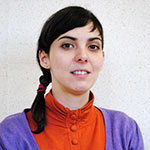 Alba Soto Gutierrez
Profesora de Expresión gráfica: Color y forma
Professor of Graphic Expression: Color and shape
Doctora en Bellas Artes y artista en activo. Su formación combina las artes visuales y las artes escénicas, especializándose en herramientas interdisciplinares y performativas para la creación y la práctica docente. Desde el año 2007 es profesora universitaria y ha impartido seminarios en universidades internacionales como Kymenlaakson University of Applied Sciences en Finlandia, UCA University for the Creative Art en Inglaterra, Hoschule fur Kunste Bremen en Alemania, Universidad de Los Andes en Colombia, SAIC School in the Art Institute of Chicago, entre otras.
Ha realizado una larga lista de exposiciones de dibujo y pintura y su trabajo artístico multidisciplinar se ha mostrado en festivales y exposiciones nacionales e internacionales en EEUU, China, Italia, Polonia, Alemania, etc. Esta práctica, combinada con la labor de comisariado, le ha permitido organizar exposiciones y encuentros en España y Estados Unidos y colaborar, compartiendo experiencias y procesos, con multitud de artistas de todo el mundo.
Además de realizar su obra personal ha organizado diferentes proyectos expositivos y performativos, colaborando y compartiendo experiencias y procesos con multitud de artistas relacionados con las artes visuales, la danza o la música. Actualmente forma parte de los grupos de investigación Teorías estéticas contemporáneas (UM1012) y Estudios Transversales en Creación Contemporánea (ETCC) y es presidenta de la Asociación de Creación e Investigación artística multidisciplinar Pelicornio Perceptual.
Alba Soto Gutierrez
Profesora de Expresión gráfica: Color y forma
Professor of Graphic Expression: Color and shape
Doctora en Bellas Artes y artista en activo. Su formación combina las artes visuales y las artes escénicas, especializándose en herramientas interdisciplinares y performativas para la creación y la práctica docente. Desde el año 2007 es profesora universitaria y ha impartido seminarios en universidades internacionales como Kymenlaakson University of Applied Sciences en Finlandia, UCA University for the Creative Art en Inglaterra, Hoschule fur Kunste Bremen en Alemania, Universidad de Los Andes en Colombia, SAIC School in the Art Institute of Chicago, entre otras.
Ha realizado una larga lista de exposiciones de dibujo y pintura y su trabajo artístico multidisciplinar se ha mostrado en festivales y exposiciones nacionales e internacionales en EEUU, China, Italia, Polonia, Alemania, etc. Esta práctica, combinada con la labor de comisariado, le ha permitido organizar exposiciones y encuentros en España y Estados Unidos y colaborar, compartiendo experiencias y procesos, con multitud de artistas de todo el mundo.
Además de realizar su obra personal ha organizado diferentes proyectos expositivos y performativos, colaborando y compartiendo experiencias y procesos con multitud de artistas relacionados con las artes visuales, la danza o la música. Actualmente forma parte de los grupos de investigación Teorías estéticas contemporáneas (UM1012) y Estudios Transversales en Creación Contemporánea (ETCC) y es presidenta de la Asociación de Creación e Investigación artística multidisciplinar Pelicornio Perceptual.
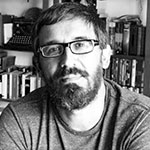 Francisco M. Valverde Hernandez
Profesor de Técnicas de ilustración digital y Creación y diseño de personajes
Professor of Digital Illustration Techniques and Character Creation and Design
Licenciado en Bellas Artes en su especialidad de Pintura. Realizó el Máster en Animación 3D de Personajes con la Universidad de Granada y la desaparecida empresa de animación Kandor Graphics. Como ilustrador ha colaborado con El País y revistas de decoración. Ha ilustrado cuentos infantiles y su producción pictórica se viene desarrollando desde los años 90. Posee cuadros en colecciones privadas y varios han sido usados en publicidad y cine. Ha trabajado varios años como restaurador de arte por toda España. Actualmente trabaja en la preparación de personajes para su propio corto animado.
Francisco M. Valverde Hernandez
Profesor de Técnicas de ilustración digital y Creación y diseño de personajes
Professor of Digital Illustration Techniques and Character Creation and Design
Licenciado en Bellas Artes en su especialidad de Pintura. Realizó el Máster en Animación 3D de Personajes con la Universidad de Granada y la desaparecida empresa de animación Kandor Graphics. Como ilustrador ha colaborado con El País y revistas de decoración. Ha ilustrado cuentos infantiles y su producción pictórica se viene desarrollando desde los años 90. Posee cuadros en colecciones privadas y varios han sido usados en publicidad y cine. Ha trabajado varios años como restaurador de arte por toda España. Actualmente trabaja en la preparación de personajes para su propio corto animado.
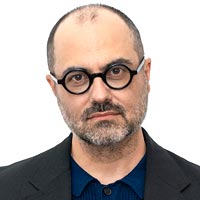 Roberto Vidal Puente
Profesor de Empresa y emprendimiento en industrias culturales
Professor of Business and Entrepreneurship in Cultural Industries
Licenciado en Economía por la UniOvi, Máster oficial en Historia del Arte Contemporáneo y Cultura visual, Centro de Estudios del Museo Reina Sofía, UCM y UAM, Máster en Diseño del IED Madrid. En la actualidad es asesor de Arquitectura y Diseño del Programa de Internacionalización de la Cultura Española (PICE) de AC/E y trabaja como consultor cultural y de educación en artes, en colaboración con instituciones públicas y privadas. Con anterioridad ha formado parte del equipo del Centro de Residencias Artísticas de Matadero Madrid y ha sido director de 2014 a 2022 de la Escuela de Artes Visuales de IED Madrid. Es cofundador de RyO, estudio y oficina de investigación sobre diseño y artes contemporáneas con clientes como son el CA2M (Madrid), MUSAC (León), Museo Nacional Thyssen-Bornemisza (Madrid), La Térmica (Málaga), Fundación Banco Santander (Madrid), Centro Andaluz de la Fotografía (Almería), Centre d’Art la Panera (Lleida), MIAC (Lanzarote), por citar algunos. También, ha sido ganador de las convocatorias de comisariado Inéditos de La Casa Encendida y Se busca comisario de la CAM y jurado de los ADG LAUS (Barcelona) y de Injuve (Madrid), en la modalidad de diseño.
Roberto Vidal Puente
Profesor de Empresa y emprendimiento en industrias culturales
Professor of Business and Entrepreneurship in Cultural Industries
Licenciado en Economía por la UniOvi, Máster oficial en Historia del Arte Contemporáneo y Cultura visual, Centro de Estudios del Museo Reina Sofía, UCM y UAM, Máster en Diseño del IED Madrid. En la actualidad es asesor de Arquitectura y Diseño del Programa de Internacionalización de la Cultura Española (PICE) de AC/E y trabaja como consultor cultural y de educación en artes, en colaboración con instituciones públicas y privadas. Con anterioridad ha formado parte del equipo del Centro de Residencias Artísticas de Matadero Madrid y ha sido director de 2014 a 2022 de la Escuela de Artes Visuales de IED Madrid. Es cofundador de RyO, estudio y oficina de investigación sobre diseño y artes contemporáneas con clientes como son el CA2M (Madrid), MUSAC (León), Museo Nacional Thyssen-Bornemisza (Madrid), La Térmica (Málaga), Fundación Banco Santander (Madrid), Centro Andaluz de la Fotografía (Almería), Centre d’Art la Panera (Lleida), MIAC (Lanzarote), por citar algunos. También, ha sido ganador de las convocatorias de comisariado Inéditos de La Casa Encendida y Se busca comisario de la CAM y jurado de los ADG LAUS (Barcelona) y de Injuve (Madrid), en la modalidad de diseño.
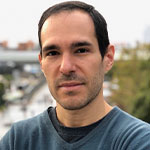 Alberto Daniel Villa Gracia
Profesor de Edición digital
Professor of Digital edition
Daniel Villa es profesor en la Universidad Nebrija, Francisco de Vitoria, Complutense de Madrid y U-Tad. Está especializado en asignaturas de edición, postproducción y tecnología audiovisual. Actualmente está certificado como Profesor Contratado Doctor y Profesor de Universidad Privada por la ANECA.
Posee 20 años de experiencia profesional en televisión, publicidad y cine como editor, postproductor o colorista. Ha trabajado como realizador de spots para MTV, Cartoon Network y Boing, y editor de publicidad para marcas como Movistar, BMW, Mercedes, Coca Cola, Endesa, Mapfre, Ministerio del Interior, ING o Banco Santander, entre otros clientes. En televisión ha trabajado para programas como Callejeros, Callejeros Viajeros, Frank de la Jungla, Wild Frank, 21 días, Corazón TVE, Lazos de Sangre, Fuera de Cobertura, Top Star, Visibles, Supergarcía o Maribáñez. En ficción y documental para cine ha trabajado en proyectos internaciones como El mal, Caracoles Serranos, Radio Atacama, Manu Carrasco: me dijeron de pequeño o Musical Nourishment of the Yam and the Banana.
Alberto Daniel Villa Gracia
Profesor de Edición digital
Professor of Digital edition
Daniel Villa es profesor en la Universidad Nebrija, Francisco de Vitoria, Complutense de Madrid y U-Tad. Está especializado en asignaturas de edición, postproducción y tecnología audiovisual. Actualmente está certificado como Profesor Contratado Doctor y Profesor de Universidad Privada por la ANECA.
Posee 20 años de experiencia profesional en televisión, publicidad y cine como editor, postproductor o colorista. Ha trabajado como realizador de spots para MTV, Cartoon Network y Boing, y editor de publicidad para marcas como Movistar, BMW, Mercedes, Coca Cola, Endesa, Mapfre, Ministerio del Interior, ING o Banco Santander, entre otros clientes. En televisión ha trabajado para programas como Callejeros, Callejeros Viajeros, Frank de la Jungla, Wild Frank, 21 días, Corazón TVE, Lazos de Sangre, Fuera de Cobertura, Top Star, Visibles, Supergarcía o Maribáñez. En ficción y documental para cine ha trabajado en proyectos internaciones como El mal, Caracoles Serranos, Radio Atacama, Manu Carrasco: me dijeron de pequeño o Musical Nourishment of the Yam and the Banana.
More Academic Information
Official Degree:Bachelor's Degree in Digital and Multimedia Design
They must be people with an open mind, a restless spirit, adaptable, creative, proactive, independent but at the same time capable of teamwork, interested in the creation, narration, production and management of digital content. People with the ability to build multimedia stories, with an interest in new technologies and the audiovisual field, and with a clear focus on digital communication.
This Bachelor's Degree turns its students into highly qualified designers in the digital environment of the most demanded sectors: traditional graphic design, web design, audiovisual design and videogame creation.
240 ECTS credits.
Minimum 12 ECTS and maximum 90 ECTS per registration and academic period
Center responsible:School of Communication and Arts
Branch of knowledge:Social and Legal Sciences
Available places: 40
Type of Education: Classroom attendance
Academic year in which it was implemented: 2017 – 2018
Languages: Spanish / English
University Services: [+info]
Competences
Basic Competences- That students have demonstrated to possess and understand knowledge in an area of study that starts from the base of general secondary education, and is usually found at a level that, although supported by advanced textbooks, also includes some aspects that imply knowledge coming from the vanguard of their field of study.
- That students know how to apply their knowledge to their work or vocation in a professional manner and have the skills that are usually demonstrated through the elaboration and defense of arguments and the resolution of problems within their area of study.
- That students have the ability to gather and interpret relevant data (usually within their area of study) to make judgments that include a reflection on relevant social, scientific or ethical issues.
- That students can transmit information, ideas, problems and solutions to a specialized and non-specialized public.
- That the students have developed the necessary learning skills to undertake further studies with a high degree of autonomy.
- Demonstrate the correct use of oral and written language in English. At least the obtaining of level B2 must be demonstrated.
- Demonstrate the correct use of oral and written language in Spanish.
- Apply the theoretical knowledge to the understanding of reality and the resolution of specific problems in the area of knowledge of Social Sciences, especially in the field of visual design and the creation of digital content.
- Compile, distinguish and categorize information from bibliographic and documentary sources.
- Apply critical reasoning based on the use of analysis and synthesis.
- Use ingenuity and develop creativity especially in the processes of visual design and creation of digital content.
- Acquire an ethical commitment at work knowing the legal system, especially applied to professional practice related to intellectual property.
- Demonstrate social sensitivity in the development of their professional and/or academic work, in compliance with current regulations at both the Spanish and European levels, the codes of good practice, the criteria of self-control, gender equality, special needs of people with disabilities, the protection of children and, in general, the principles contained in the Spanish Constitution and the values of the Culture of Peace.
- Demonstrate the ability to work as a team, developing interpersonal relationships, within the development of visual design projects and creation of digital content.
- Demonstrate the ability to effectively lead and manage projects, assuming the principles of social responsibility.
- Apply innovative and dynamic techniques of work, project and team management.
- Develop and demonstrate initiative and an entrepreneurial spirit.
- Solve problems that arise in the construction of digital content and in the development of communicative and creative processes.
- Develop personal skills and abilities needed in the sector of creation of visual design and digital content and the company for the incorporation into the labor market, increasing maturity and adaptation for subsequent learning periods.
- Correctly handle new communication technologies.
- Apply the skills acquired throughout the educational program.
- Apply in a practical way the knowledge acquired in the training program during the development of the professional activity.
- Know and understand the basic concepts of the field of visual design, communication, business, law, information technology, history, economics and modern language as matters that influence and interact with the creation of digital content.
- Know the evolution of visual design: characteristics, relationship with users and the impact of technology on its development.
- Understand the current world through contemporary art with special reference to communicative and audiovisual messages.
- Know and apply the fundamentals of audiovisual language in the production and analysis of audiovisual products.
- Know the esthetic and technical foundations of photographic composition by combining a theoretical-practical nature.
- Know and apply the basic business concepts to the activity developed in the cultural industries sector. Development of innovation and entrepreneurship in this sector.
- Correctly handle communication technologies and the phases of planning, design, coding and implementation of websites.
- Know the basic principles of computer programming.
- Know the techniques of artistic creation, theories of color and form.
- Know the architecture of the letter and the different typographical families of Latin alphabets and their application.
- Create and develop graphic, image, audiovisual and digital elements.
- Know and apply the principles and techniques of artistic creation to the conceptualization, design and development of characters.
- Know and apply the essential techniques of modeling and three-dimensional representation of shapes from a design.
- Design and edit digital content.
- Know the fundamental principles of the construction of a script and establish the mechanisms for its adaptation to the different transmedia platforms.
- Know and apply the fundamentals and creative methods in the generation of ideas in visual design projects and digital creation contents.
- Design and apply methods for evaluating usability in digital environments.
- Apply creative writing techniques in the construction of stories.
- Devise, execute, present and defend a project of their own that gathers the knowledge acquired in the educational program.
Estudio a Distancia
Admission
Admission Criteria
The access routes to the Bachelor’s Degree in Digital and Multimedia Design are described below. In addition, Nebrija University will publish on its website the places available for the first year of the Bachelor's Degree in Digital and Multimedia Design, distributing the number of places awarded for each study modality as it considers best.
1. Students who have a baccalaureate degree and have passed the University Access Tests may apply for admission, in accordance with the provisions of Royal Decree 1892/2008, of November 14, which regulates the access conditions to official university teachings of Bachelor's Degrees.
2. Also, and in accordance with the provisions of RD 412/2014, the following students may apply for admission to the university:
a) Graduates in European Baccalaureate or International Baccalaureate.
b) Students who have degrees, diplomas or Baccalaureate studies from educational systems of Member States of the European Union, or other States with which international agreements applicable in this regard have been signed, on a reciprocal basis.
c) Students who have degrees, diplomas or studies homologated to the Baccalaureate degree of the Spanish Educational System, obtained or carried out in educational systems of States that are not members of the European Union with which no international agreements have been signed in reciprocity for the recognition of the Baccalaureate degree, notwithstanding the provisions of article 4 of RD 412/2014.
) Students who have official degree of Senior Technician in Vocational Formation, of Senior Technician in Plastic Arts and Design, or of Senior Sports Technician belonging to the Spanish Educational System, or degrees, diplomas or studies declared equivalent or homologated to said degrees, without prejudice of the provisions in article 4 of RD 412/2014.
e) Students who have degrees, diplomas or studies, other than those equivalent to Baccalaureate degrees, Senior Technician in Vocational Training, Senior Technician in Plastic Arts and Design, or Senior Sports Technician of the Spanish Educational System, obtained or carried out in a member State of the European Union, or in other States with which international agreements have been signed that are applicable in this regard, on a reciprocal basis, when said students meet the academic requirements demanded in said Member State to access its Universities.
f) People who have passed the university entrance exam for people over 25 years old.
g) People who have passed the access test for official Bachelor's degree studies for people over 40 years old, through accreditation of work or professional experience. The procedures for admission through this route are reflected in the “POA_9 Access procedure over people over 40 years
h) People who have passed the university entrance exam for people over 45 years old.
i) Students who have an official Bachelor's, Master's or equivalent degree.
j) Students who have an official Associate's Degree, or a degree as Technical Architect, Technical Engineer, Undergraduate, Architect, Engineer, corresponding to the previous ordinance of university education, or an equivalent degree.
k) Students who have taken partial foreign or Spanish university studies, or who have finished foreign university studies but have not obtained their homologation in Spain and wish to continue studies at a Spanish university. In this case, it will be an indispensable requirement that Nebrija University have recognized at least 30 ECTS credits.
l) Students who were able to access the university according to regulations of the Spanish Educational System prior to Organic Law 8/2013, of December 9.
• In the case of students with special educational needs derived from disabilities, the need for possible curricular adaptations, itineraries or alternative studies will be assessed.
4.2.2 Admission Criteria
At the Antonio de Nebrija University, the admission procedures established by university legislation will be carried out with particular reference to the guiding principles of accessing Spanish universities: equality, merit, ability, universal accessibility and adjustment to the criteria of the European Higher Education Area.
Methods and deadlines for submitting admission applications
In order to apply for admission to any official university Bachelor's degree, it will be necessary to complete the corresponding admission application through the University website, or request it at any of the university campuses within the deadlines established by the Department of University Development.
Documentation necessary for admission to Bachelor's degree studies
a) Students with University Entrance Exams (from Baccalaureate and university entrance exams for people over 25yo):
Those who have attended the University Entrance Exams must bring:
• Copy of DNI or accrediting document.
• Report card with the grades of the University Entrance Exams.
• Personal academic record with the grades obtained in baccalaureate.
• File Transfer Fees sealed by the University Secretary where the University Entrance Exam (Selectividad) was taken
b) Students who have a degree, diploma or studies equivalent to the Baccalaureate degree in educational systems from Member States of the European Union or from other States with which applicable international agreements have been signed, on a reciprocal basis. Graduates of European Baccalaureate or International Baccalaureate.
• Copy of Passport or accrediting document.
• Credentials for compliance with the requirements issued by the UNED or by the specified entity.
• Report card with grades obtained in the University Entrance Exams, if applicable.
• Accreditation of a B1 level in the Spanish language in the case of students whose nationality does not correspond to Spanish-speaking countries. (The accreditation of the level will be validated through the official diplomas admitted by the table of certificates accepted by ACLES)
c) Students from Advanced Vocational Training, Second Degree Vocational Training:/p>
These students must provide the following:
• Copy of the DNI or accrediting document.
• Personal academic record with the grades obtained and the final numerical grade.
• Diploma or the receipt of having paid the issuing fee of the diploma.
• In their case, document stating the result of the Specific Phase of the University Entrance Exams
d) University Graduates:
• Photocopy of the DNI or accrediting document.
• Academic record with the grades of each of the subjects taken and the final grade average.
• Diploma or receipt of having paid the issuing fee for the diploma.
In the case of students with validated foreign degrees, they must provide the following documentation:
• Photocopy of Passport, DNI or accrediting document.
• Homologation of the university degree.
• Equivalences of grade averages of studies taken in foreign centers. The university will be able to check the grades through the application notesmedias.aneca.es that is available for students and centers
• Accreditation of a B1 level in the Spanish language in the case of students whose nationality does not correspond to Spanish-speaking countries. (The accreditation of the level will be validated through the official diplomas admitted by the table of certificates accepted by ACLES)
e) Students from previous educational arrangements who have not attended the general phase of University Entrance Exams, regulated in Royal Decree 1892/2008, of November 14:
• Students from COU (college preparation courses) prior to the 1974-75 academic year, and students who have passed the Higher Baccalaureate with a state exam: copy of DNI, grade book and the grade card of the specific phase of the University Entrance Exams, if applicable.
• Students who have passed the Higher Baccalaureate, PREU and the Maturity Test: copy of DNI, grade book, Maturity Test card and the grade card of the specific phase of the University Entrance Tests, if applicable.
f) Students with partial recognition of foreign studies:
These students must submit the following documentation, officially translated and legalized, if applicable:
• Recognition request application form.
• Copy of Passport or accrediting document.
• Academic record accrediting the level and type of studies carried out, issued by the corresponding official Center, stating, at least, the following data: subjects taken, the credits or hourly load of each, grade and table or scale of grades.
• Curriculum or table of subjects of the degree to which the subjects to be recognized belong, with express indication of the duration of those studies in academic years and the subjects that comprise it, and with the original seal of the Center of origin, or failing that, the documentation requested in the credit recognition procedure.
• Subject programs, with details of the content and scope (hours and credits) with which they have been taken, and with the original stamp of the Center of origin or, failing that, the documentation requested in the credit recognition procedure.
• Accreditation of a B1 level in the Spanish language in the case of students whose nationality does not correspond to a Spanish-speaking country. (The accreditation of the level will be validated through the official diplomas admitted by the table of certificates accepted by ACLES)
Equivalences of average grades of studies carried out in foreign centers. The university will be able to check the grades through the application notesmedias.aneca.es that is available for students and centers.
i) Students requesting admission due to change of university and/or studies.
Students from other universities must submit the following documentation:
• Copy of the DNI or accrediting document
• Copies sealed by the university of origin of the official content and competence programs, or teaching guides, of the different subjects passed or, failing that, the documentation requested in the credit recognition procedure
• Personal academic record of university studies started with an average grade of 0-10, based on the provisions of Royal Decree 1125/2003 (BOE 18/09/2003).
• Photocopy of the BOE where the degree's curriculum is published.
j) Access to the University for people over 45 yo.
• Copy of the DNI or accrediting document
• Certificate accrediting the passing of the Entrance Exam for those over 45 years old (test carried out at Nebrija University)
Only those candidacies that have submitted the required documentation within the deadlines established by the Admissions Department will be processed. In addition, the student will be asked for all the additional information that was deemed appropriate in order to know the candidate's suitability for the Bachelor's Degree.
For the purposes of pre-admission and admission, the evaluation of the candidate will be made using 0 to 10 points, taking into account the following criteria and percentages:
Academic record of the student's route of origin: 60%
Multiple-choice psychotechnical test: 10%
This test consists of an assessment of competences/skills related to: abilities in intellectual work, attitudes towards cooperation and teamwork, time and resource management. We will try to determine if the candidate has sufficient motivation, training and knowledge, skills, aptitudes, communication skills, extracurricular activities and future interests necessary to be admitted as a student of the Bachelor's Degree in Digital and Multimedia Design at the Antonio de Nebrija University.
English level test: 10%
In addition to the competences established in the Bachelor's Degree in Digital and Multimedia Design, we have included another related to the adequate knowledge of the English language, both oral and written. To this end, the Vice-Rector’s Office of Academic Organization and Faculty has established a series of strategies of a diverse nature to facilitate the acquisition of said competence by students, among which are the use of materials in English and the programming of subjects in English.
In order to know the students' real level of knowledge of the English language, the Institute of Modern Languages will design a language placement test. Based on the results of this test, students will simultaneously take the chosen Bachelor's Degree, and depending on each student's level, the “Diploma in English Professional Communication”.
The English level tests consist of a written exam with multiple choice questions, oral and written comprehension and use of the language, with a duration of 60 minutes. They are taken in person or online, and are held in computer rooms on each campus, with professors from the Institute of Modern Languages. Depending on the results of this test, the student will be placed at the corresponding level. The minimum level one can access at the beginning is B1.
The student who decides to take the subjects in English must reach a B2 level in the test in order to guarantee that this language can be the vehicular language of his/her academic program and, therefore, that he/she can achieve the skills connected to each subject. If the student does not pass this placement test, they must take the subjects in Spanish.
It will not be necessary for the candidate to take the language placement test if they provide a document proving their English level. The level accreditation will be validated through the official degrees established by the table of certificates accepted by ACLES, and they will also be reviewed by the Institute of Modern Languages.
Specific test of knowledge about the Bachelor's Degree in Digital and Multimedia Design. It contains multiple-choice questions and consists mainly of specific contents of some of the main areas of general knowledge (basic principles of design, knowledge about content creation, basic principles of the multimedia and digital field) that will be studied in the degree chosen by the candidate, in addition to other elements common to all degrees. This test will weigh 20% of the total.
Personal interview: As a strategy to know the characteristics of the applicants, the psychopedagogical guidance department, as a diagnosis, will apply a personality test to all candidates that explores the emotional, intellectual, social and norms and values areas of each candidate for the Bachelor's Degree in Digital and Multimedia Design at the Antonio de Nebrija University.
In the event that an applicant presents any clinical indicator, an in-depth interview will be carried out with the psychologists of the Department of Psychopedagogical Guidance, and if necessary, they will be sent for clinical evaluation by the specialized teachers in Psychiatry or/and Clinical Psychology.
All tests and student records will be evaluated and assessed by the Bachelor's Degree Admissions Committee, taking into account the criteria reflected in the "PGA_11 Procedure for the Operation of the Bachelor's Degree Admissions Committee", which are part of the Internal Regulations that govern the access of candidates to the University.
The Admissions Committee will meet when necessary and will communicate the result of the admission to the candidate through email, telephone and letter so that they can proceed with their enrollment.
Employability
Career Opportunities
The Bachelor's Degree in Digital and Multimedia Design has collaboration agreements with some of the best companies and institutions in the sector, where students can carry out their professional internships and thus obtain a solid work experience of maximum demand.
The Bachelor's Degree in Digital and Multimedia Design enables graduates to perform the following professional profiles:
Internships
The Degree in Digital and Multimedia Design has collaboration agreements with some of the best companies and institutions in the sector, where students can complete their professional internships and thus obtain a highly demanding first work experience.
Companies in an agreement with Nebrija University regarding internships Action procedure in carrying out external practices Management process for external internships and Professional Guidance Labor insertion survey report More informationEmployability recognized in the Rankings
The commitment of Nebrija University to the academic requirement, training in leading companies and institutions, innovation in multidisciplinary programs and international projection, places the University in the top positions of the most important rankings.
The International Ranking QS Stars awards Nebrija University the maximum score in the quality and satisfaction of students in teaching, employability of the graduates and the internationalization of the institution.
The national rankings also recognize Nebrija University as the first Spanish university in teaching and second in employability, highlighting its performance in research, knowledge transfer and internationalization.
The Bologna Declaration formalized the principles on which the European Higher Education Area should be based: quality, mobility, diversity, competitiveness and employment growth.
From this, Nebrija stands as an academic model of reference, educating students with excellent individual behavior, interaction with their environment and motivated by and for constant and continuous training. The Nebrija Institute of Professional Skills works every day to achieve the differentiation of our students through the development of attitudes and skills.
The main objective is for students to achieve the best of themselves through the development and empowerment of their personal skills and resources through personal self-knowledge.
In addition, some of the professional skills that are worked on within the three seminars are those related to interpersonal skills and active communication skills and negotiation, indispensable for our students to know how to transmit ideas, to argue them, to provide information and opinions in an adequate, clear and convincing way.
Within what will be their work performance, other aspects such as teamwork, conflict resolution and project management ability will be worked on.
In the third block, skills worked on are those aimed at increasing the student's employability. They will work with tools and techniques for job searching, and perform tasks that achieve in the student a greater use of their personal skills.
For all this we have currently active experts in selection of people, professionals dedicated to personal and professional training and professionals dedicated to the world of communication and the arts.
In this way, and in a complementary way to his/her specific training, we help the student create a differentiating pattern in the social and business environment in which he/she will be immersed when he/she finishes his/her studies.
International
The Department of International Programs of the Nebrija University makes a constant effort of monitoring the agreements with the most prestigious universities. The students can study in one of the following foreign universities:
Students of the Bachelor's Degree in Fine Arts can study at one of the following foreign universities:
NOTE: The universities of destination, offered by degree, may vary according to the International Mobility Program. For more up-to-date information students can consult the information online in the International Mobility Program.
Several universities have special academic or linguistic requirements. For more information, consult the Department of International Programs.
La Universidad Nebrija dispone de talleres especializados para el desarrollo de los programas de Artes, incluyendo espacios dedicados al Dibujo y la Pintura, el Aula de Proyectos con su taller de Grabado y Estampación, así como Aulas Polivalentes para las Artes Escénicas, que cuentan con un espacio escénico adaptado para actividades teatrales.
Aquí podéis ver algunos de los espacios dedicados al arte en el Campus
Nebrija University offers specialized workshops for the development of its Arts programs, including spaces dedicated to Drawing and Painting, the Project Classroom with its Printmaking and Etching workshop, as well as Multi-purpose Classrooms for the Performing Arts, which feature a dedicated stage space for theatrical activities.
Immersive Nebrija: Lebrija
The students of the Degree in Digital Design and Multimedia took their Immersive Nebrija project with videomapping to Lebrija (Seville), the birthplace of Antonio de Nebrija on the occasion of the V Centenary of his death.
Immersive Nebrija: The power of the Word
Videomapping conceived by undergraduate students in Alcalá de Henares (Madrid). Antonio de Nebrija and Miguel de Cervantes, the two parents of the current Spaniard, were the protagonists of this immersive experience.
Immersive Nebrija: ConCienciArte
Nebrija Immersive celebrates its first edition at the Circulo de Bellas Artes de Madrid (CBA) giving visibility to the work of the students of the Degree in Digital Design and Multimedia of the Nebrija University, around the concept of the power of the word, digitally projecting terms and words in the mythical Puerta de Alcalá in Madrid.
Nebrija CREA Awards 2023
The students from the Fashion Design, Fine Arts, Performing Arts, and Digital and Multimedia Design programs at Nebrija University's School of Communication and Arts proudly unveiled the winners of the fifth edition of the Nebrija CREA Awards. Lluís Homar was honored in the Performing Arts category, Estudio Maison Mesa received recognition in the Fashion category; Miss Beige triumphed in the Visual Arts category, and Estudio Espada y Santa Cruz emerged victorious in the Digital Design category.
See article4th Edition Nebrija CREA Awards
The prizes, awarded by Bachelor's students, went to Cristina García Rodero, winner of the Visual Arts award in this fourth edition; Abril Zamora, Performing Arts award; the Costume Museum, Fashion Design award; and Rebeka Arce, Digital Design Award.
See articleIII Edition of the Nebrija CREA Awards
The 3rd Edition of the Nebrija CREA Awards values the professionals who inspire our Arts students, bringing the best practices of the creative industries of which they will be part of in the future to the University. In this edition, the winners were Pepa Pedroche in the Performing Arts category, Cristina Jul in the Fashion category, Marina Vargas in the Visual Arts category and Alberto Mielgo in the Digital Design category.
6th Edition of the Nebrija CREA Awards
On November 28, the School of Communication and Arts successfully hosted the 6th edition of the Nebrija CREA Awards at the Madrid-San Francisco de Sales campus.
The evening was filled with talent, creativity, and emotions, celebrating the careers and achievements of prominent figures in the artistic world. Awards were given to: Greta Alfaro for Visual Arts, Adriana Ozores for Performing Arts, Duyos for Fashion Design, and Manuel Estrada for Digital and Multimedia Design.

